

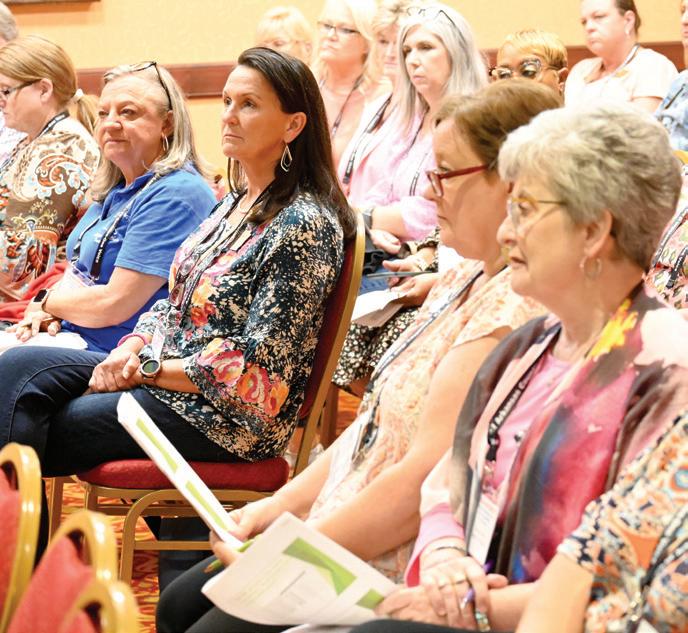


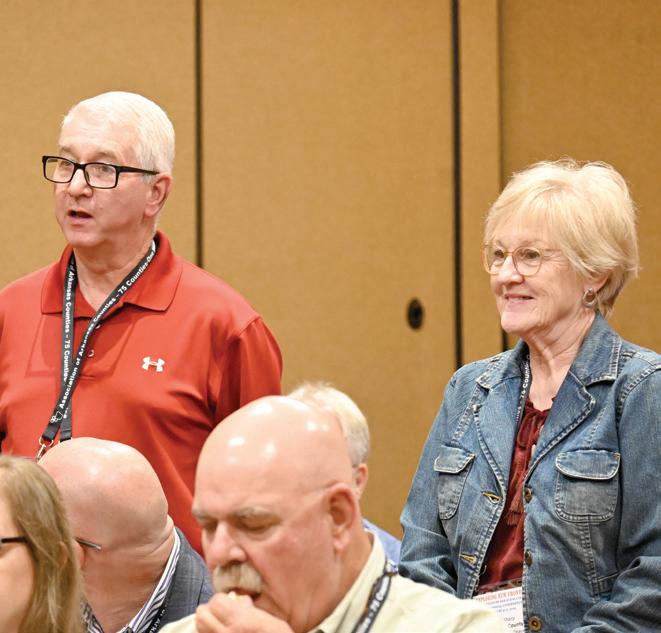

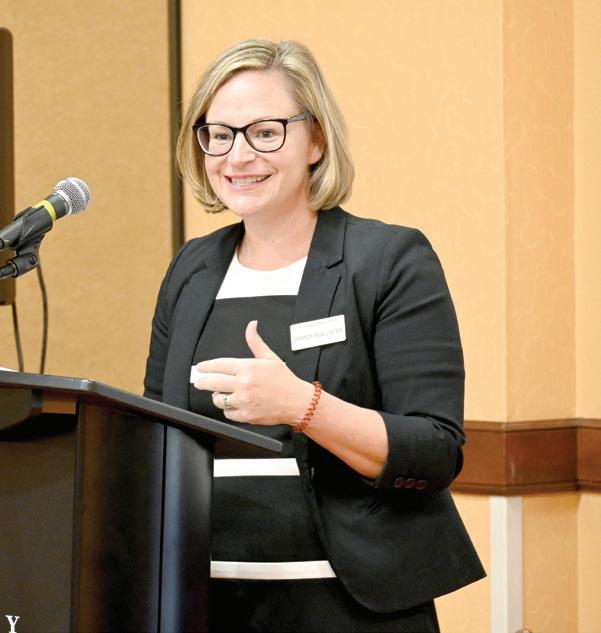






The Official Publication of the Association of Arkansas Counties Annual Conference Recap EXPLORING NEW FRONTIERS
33-48
2023
Pages
Summer
County Lines County Lines
GIS MAPPING USER FRIENDLY INTEGRATION

Office specific extensions tailored to your day-to-day business needs. Map parcels, address points, roads, pavement issues, voters, and so much more!
Easily create, edit, and export items at anytime from anywhere. The site is mobile-friendly and backed by our unparalleled customer support team.
Real-time access to the local, state, and federal data sources you need to make informed decisions. Bringing everyone and everything together.

Phillip Carper, Director of Sales & Accounts pcarper@datascoutpro.com • 501-993-0774 ASSESSOR • ADDRESSING • VOTING • LAW ROAD & BRIDGE • EMERGENCY MANAGEMENT
WORKING TO STOP SEX TRAFFICKING

In the past 12 months, the RHS Sex Tra cking Litigation Team has successfully tried to verdict, and settled, multiple cases against motels in Arkansas that have turned a blind eye to sex tra cking. In addition, they worked with the 2023 Arkansas General Assembly to pass additional litigation to help stop sex tra cking in Arkansas.



Recipients of the Arkansas Trial Lawyers Association’s 2023 Roxanne Wilson Advocacy Award:





Our goal is to sue those who are allowing sex tra cking at business establishments in Arkansas, so those businesses will stop allowing their premises to be used for sex tra cking commerce!
We will gladly share all we have learned with any sheri or prosecuting attorney or anyone else wanting to use the tort law (civil lawsuits alleging negligence) to help stop sex tra cking in Arkansas. We will share all our work product, with no strings attached.
Just give us a call at 888-8888.
ERIC WEWERS DENISE HOGGARD LAUREN MANATT MEREDITH MOORE
RHS SEX TRAFFICKING TEAM
RESPONSIBLE ATTORNEYS: MIKE RAINWATER & BOB SEXTON LITTLE ROCK CONWAY JACKSONVILLE HOT SPRINGS SPRINGDALE BRYANT MEMPHIS
ROADS LEAD TO WEEKEND ESCAPES.
Roads are literal and metaphorical connectors. They provide essential delivery of our daily needs – they also lead us to the things that matter most. As Americans, we depend on them for our safety and for our livelihoods. At Ergon, we are proud to work in communities across America helping build and maintain vital infrastructure that connects us all to what matters most.

In This Issue SUMMER
2023
CONFERENCE RECAP
AAC Names Scholarship Recipients.............................................33
Darter Recognized During Conference.........................................36
Officials Explore New Frontiers......................................................38
AAC Hosts Kemp Memorial Scholarship Golf Tournament......44
Thank You to Exhibitors and Sponsors.........................................48
Features
Arkansas Pays Tribute to Charlie Daniels....................................29
AAC Staff Profile: Drew Gazaway................................................51
AAC Staff Profile: Erica Archer....................................................51
AAC Photo Recap: Circuit Clerks....................................................52
AAC Photo Recap: Treasurers........................................................53
AAC Photo Recap: Assessors......................................................54
AAC Photo Recap: Collectors......................................................55
AAC Photo Recap: County Clerks...................................................56
Cover Notes: Exploring New Frontiers
AAC Photo Recap: Sheriffs..............................................................57
AAC Photo Recap: Judges...............................................................58 Workers’ Comp Fund Pays Dividends...........................................60
The 55th Annual AAC Conference took place Aug. 9-11 in Rogers/Benton County with more than 850 people in attendance. The theme for this year’s conference was “Exploring New Frontiers.” During the conference, elected officials from the AAC’s nine member associations heard from engaging speakers and participated in educational breakout sessions. You can read more about the conference on pages 33-48 of this issue of County Lines magazine.


Counties Receive PILT Payments..................................................61
President’s
Governmental
Surety
Departments From the Director’s Desk...................................................................7
Perspective.....................................................................9 AAC Research Corner.......................................................................12 Seems to Me.....................................................................................18 Legal Corner......................................................................................20
Affairs......................................................................21
Bonds ......................22 ARORP Update..................................................................................24 AAC Risk Management Services...................................................28 AAC Member Services......................................................................30 News from NACo...............................................................................62
Photos by: Christy L. Smith and Sarah Perry
COUNTY LINES, SUMMER 2023 5
— Photos by Christy L. Smith and Sarah Perry
2023-24
Oct. 10-13
Circuit Clerks
Mount Magazine State Park, Paris
Oct. 23-27
Assessors
Fort Smith
Dec. 6-8
Collectors
Fairfield Inn & Suites, Benton
Jan. 28-31
Sheriffs
Marriott, Little Rock
Feb. 14-16
County Clerks
Holiday Inn Convention Center, Texarkana
March 5-7
Treasurers
DeGray Lake Resort State Park, Bismarck
March 5-8
Assessors
Basin Park, Eureka Springs
March 26-28
Circuit Clerks
Fairfield Inn & Suites, Benton
Calendar activities also are posted on our website: www.arcounties.org
Contact AAC
Chris Villines, Executive Director cvillines@arcounties.org
Anne Baker, Executive Assistant abaker@arcounties.org
Loretta Green, Receptionist lgreen@arcounties.org
Eddie A. Jones, Consultant e.jonesconsulting@gmail.com
Mark Whitmore, Chief Legal Counsel mwhitmore@arcounties.org
Colin Jorgensen, AAC Litigation Counsel cjorgensen@arcounties.org
Josh Curtis, Governmental Affairs Director jcurtis@arcounties.org
Lindsey French, Legal Counsel lfrench@arcounties.org
Christy L. Smith, Communications Director csmith@arcounties.org
Sarah Perry, Communications Coordinator sperry@arcounties.org
Michael Roys, ACE Program Coordinator mroys@arcounties.org
The Association of Arkansas Counties supports and promotes the idea that all elected officials must have the opportunity to act together in order to solve mutual problems as a unified group. To further this goal, the Association of Arkansas Counties is committed to providing a single source of cooperative support and information for all counties and county and district officials.
The overall purpose of the Association of Arkansas Counties is to work for the improvement of county government in the state of Arkansas. The Association accomplishes this purpose by providing legislative representation, on-site assistance, general research, training, various publications and conferences to assist county officials in carrying out the duties and responsibilities of their office.
1415 West Third Street Little Rock, AR 72201 (501) 372-7550 phone / (501) 372-0611 fax www.arcounties.org
Cindy Posey, Accountant cposey@arcounties.org
Jenny Evans, Accounting & Program Assistant jevans@arcounties.org
Mark Harrell, IT Manager mharrell@arcounties.org
Risk Management/ Workers’ Compensation
Debbie Norman, Risk Mgmt. & Insurance Director dnorman@aacrms.com
Misty Petrus, Workers’ Comp Claims Mgr. mpetrus@arcounties.org
Cathy Perry, Program Analyst cperry@aacrms.com
Kim Nash, Workers’ Comp Claims Adjuster knash@aacrms.com
Renee Turner,Workers’ Comp Claims Adjuster rturner@aacrms.com
Jacob Trumble, Claims Analyst jtrumble@arcounties.org
Greg Hunt, Claims Analyst ghunt@aacrms.com
Kim Mitchell, Premium Analyst kmitchell@aacrms.com
Karen Bell, Program Assistant kbell@aacrms.com
Ellen Wood, Admin. Asst./Receptionist ewood@aacrms.com
Brandy McAllister, RMS Counsel bmcallister@arcounties.org
JaNan Thomas, RMS Litigation Counsel jthomas@arcounties.org
Melissa Dugger, RMS Litigation Counsel mdugger@arcounties.org
Aaron Newell, RMS Litigation Counsel anewell@arcounties.org
Mallory Floyd, RMS Employment Counsel mfloyd@arcounties.org
Fonda Fitzgerald, RMS Paralegal ffitzgerald@arcounties.org
Shantina Osborn, RMS Paralegal sosborn@arcounties.org
Samantha Wren, RMS Legal Assistant swren@arcounties.org
Erica Archer, RMS Legal Assistant earcher@arcounties.org
James Mirus, Member Services Manager jmirus@arcounties.org
AAC Mission Statement
6 COUNTY LINES, SUMMER 2023
County Lines
County Lines [(ISSN 2576-1137 (print) and ISSN 2576-1145 (online)] is the official publication of the AAC. It is published quarterly. For advertising inquiries, subscriptions or other information, please contact Christy L. Smith at 501.372.7550.
Executive Director/Publisher
Chris Villines Communications Director/ Managing Editor
Christy L. Smith
Communications Coordinator/Editor
Sarah Perry
AAC Executive Board:
Debbie Wise – President
Brandon Ellison – Vice President
Jimmy Hart – Secretary-Treasurer
Tommy Young Deanna Sivley
Debra Buckner Dana Baker
Kevin Cleghorn Terry McNatt
Rebecca Talbert Doug Curtis
Gerone Hobbs Marty Boyd
John Montgomery Heather Stevens
Brenda DeShields Selena Blair
Bobby Burns
National Association of Counties (NACo) Board Affiliations
Debbie Wise: NACo board member. She is Randolph County Circuit Clerk and president of the AAC Board of Directors.
Brandon Ellison: NACo board member. He is Polk County Judge and vice-president of the AAC Board of Directors.
Ted Harden: Finance & Intergovernmental Affairs Steering Committee. He is a member of the Jefferson County Quorum Court.

Barry Hyde: Justice and Public Safety Steering Committee. Vice Chair of Transportation Steering Committee. He is the Pulaski County Judge.
Rusty McMillon: Justice and Public Safety Steering Committee. He is Greene County Judge
Kevin Smith: IT Standing Committee. He is the Sebastian County Director of Information Technology Services.
Gerone Hobbs: Membership Committee. He is the Pulaski County Coroner.
Paul Elliott:Vice Chair of Justice and Public Safety Steering Committee, vice chair of law enforcement subcommittee. He is a member of the Pulaski County Quorum Court.
Ellen Foote: Community, Economic & Workforce Development Steering Committee. She is the Crittenden County Tax Collector.
Tawanna Brown: Telecommunications & Technology Steering Committee. She is Chief Computer Operator for Crittenden County.
Respect should fill our political conversations
Another fantastic annual conference is in the books, and I could not be more pleased with seeing all of you, learning great things and coming together for the betterment of county government. Fantastic speakers like Congressman Steve Womack, Admiral Peter Cressy, Hunter Yurachek and videos from Gov. Sarah Huckabee Sanders and Attorney General Tim Griffin highlighted three days of learning how to better fulfill our duties back home.
This issue of County Lines contains many stories recapping our event, but I wanted to take a little space to brag on our great staff here at the AAC and thank them for all the hard work they put in to make our conferences a success. Anne Baker did an amazing job from 50,000 feet to sea level on this event, and our staff led association meetings, legislative meetings, jail training meetings, spouse programs and morning walks superbly.
One of the best parts of the conference is seeing your leadership from individual associations come together as the AAC Board of Directors, and I look forward every year to sharing the stage with the finest people on earth … folks who work hard for their respective counties and help direct and guide our organization to be extremely successful. Thank you all for the hard work you do, and the hours spent working with us to improve the association and our conferences.
Many of you attended your first annual conference as newly elected officials. We hope you learned a lot about leadership, resources and opportunities that lie in front of you. As you turn the corner into your second year in office you should be getting your bearings straight, and we can’t wait to see what ideas you are implementing to make our counties better.
But as I spent some time reflecting on this recently, I was reminded of the realities of public service and the political winds that blow each election cycle. What has become of our national politics is a dangerous affront to much of the real work that is done at a local level. And while many of us realize the constant bickering we see on television is a charade, it has morphed with social media to become a real obstacle to local government.
I was pondering the days of my youth, when the only arguing about politics I remembered took place in living rooms among families, and it was done so with a final product that was still loving and respectful. The unwritten rule was that politics was rarely argued publicly and if it was discussed, it was always with great respect and handshakes at the end. Not so anymore.
And for you now, Mr. or Ms. Elected Official, how much does the national banter really impact how you send out statements in a collector’s office? Does the assessor label tracts of land as red or blue? Does the coroner use different gurneys depending on whose sign is in the front yard? Not a chance. We do our best to fulfill constitutional and statutory obligations of the state and counties in the eye of a hurricane. This can be a difficult task at times, and I would like to bestow the greatest appreciation for all of you who work every day to live in this vacuum.
Some of the arguing would seem laughable when you look at it through a local lens, but for the fact that an increasing number of our friends treat ideological positions as sacrosanct doctrines. This can lead to misplaced judgment of people. I
>>>
AAC DIRECTOR’S DESK
Chris Villines AAC Executive Director
COUNTY LINES, SUMMER 2023 7
would submit that HOW we argue about our positions is almost, if not more important to the positions themselves and that we will ultimately answer more for our respect for one another than whether we won a probably unwinnable disagreement.

Our government works. Arguing loudly is a negative byproduct that changes no one’s mind. Federal, state, and local governments ultimately make the right decisions under a representative republic system. Those who do not must answer to the people at election time.

Over the last few election cycles the trend has been repetitive. Leading up to the election Facebook, Twitter and “news” reporting all become almost intolerable for a while. What were once safe havens (like church or the grocery store) now have patrons who would rather argue about the presidential race than share recipes or favorite verses. Post election the discussions grind down but less and less each time. And civility seems to disappear from our universe … for a while.
There is a healthy way to disagree, an art that Americans seem to be losing. If we’d just agree that we all want what is best for our great country, state, and county … then respect would fill the conversation. This would go a long way toward

restoring our civility. We must live in this world together, and you as elected officials must effectively administer your ministerial duties regardless of election outcomes. You feel added pressure because you represent “the government” to people, when in fact what you do is often dissociated from politics. But your opinion is valued because of the position you hold, which means often you find yourselves as the E.F. Hutton in a crowded room (you youngsters can go look those ads up to understand).
Enough lamenting for now, but I will leave you with a tad of encouragement. I’ve long appreciated national radio personality Dave Ramsey. While I am sure he believes involvement in our political system is important, he has one saying that establishes fundamentally sound priorities. It is, “What happens in YOUR house is more important than what happens in the White House.” Even though you work in the political sphere remember that very little in our county offices is directly impacted by what happens miles away in D.C. or Little Rock. Keeping local government in good operating standard will serve you and your constituents far better than the best or worst legislation, rulemaking or bickering from afar.

AAC DIRECTOR’S DESK WE KEEP YOUR COUNTY Springdale Batesville Searcy West Memphis Fort Smith Hot Springs Little Rock Hope Texarkana, TX 9 locations in Arkansas! ROLLING TOLL FREE 877.786.4681 Check out our STM Arkansas stores! 8 COUNTY LINES, SUMMER 2023
Conference focuses on ‘New Frontiers’
The AAC staged another successful conference
Aug. 9-11 in Rogers/Benton County. The 55th Annual Conference attracted more than 850 attendees. Plus, there were 97 exhibitors and 30 sponsors. And we extend our gratitude to those who continue to support county government; we could not offer such a strong program without you.

This year’s theme was “Exploring New Frontiers,” and what an appropriate theme it was.
Starting with Congressman Steve Womack on Day 1 and ending with University of Arkansas Vice Chancellor and Director of Athletics Hunter Yurachek on Day 3, presentations focused on adapting to change and honing leadership skills. These are important topics to local government officials. The climate in which we work is ever changing, thus it can be challenging. Our officials must be properly equipped to handle sometimes-unexpected situations.
Two state cabinet secretaries joined us during the event — Secretary Kristi Putnam of the Department of Human Services and Secretary Joe Profiri of the Department of Corrections. Secretary Putnam and her staff discussed the status of crisis stabilization units and plans to provide alternative beds to those ordered to the state hospital. Secretary Profiri and his staff discussed ways they are working to increase the capacity in state prisons and to implement a new truth in sentencing law.
We welcomed members of the state legislature, who discussed and answered questions about other new laws passed during the 94th General Assembly. Some of those new laws concern voting and the Freedom of Information Act, among other things local government officials deal with daily.
Things we’ve seen in the news but never thought we would have to grapple with here — data centers, use of force, cybersecurity breaches, and preparing for large-scale events such as the 2024 solar eclipse — were explored.
All the changes and crises we face can be daunting, but someone I admire was there to teach us some of the leadership principles needed to address the various situations we are presented with.
I had heard Admiral Peter Cressy, director of executive leadership programs at the Washington Presidential Library at Mount Vernon, speak before. His use of George Washington as an example of the type of leaders we should strive to be is fascinating. Admiral Cressy walked listeners through Washington’s life from a flawed youth who was overly ambitious and made many mistakes to the great man we remember today. Washington did not let his mistakes destroy his overall objectives. Instead, he learned from his mistakes. He studied others and listened to mentors. He developed self-control, patience, and awareness. And he remained an avid learner throughout his life.
If you joined us at conference this year, I hope you took those lessons to heart and will implement them in not only your career, but also your life. For those who were unable to join us at conference this year, I encourage you to do so next year. The dates are Aug. 7-9, and we will be in Hot Springs/Garland County. The AAC staff always puts together an informative and useful program. On the pages that follow, you will see recaps from this year’s event.
We want your news
Debbie
Did an aspect of county government “make news” recently in your county? Did any of your county officials or staff get an award, appointment or pat on the back? Please let us know about it for the next edition of County Lines magazine. You can write up a couple of paragraphs about it, or if something ran in your local paper, call and ask them to forward the story to us. We encourage you or your newspaper to attach a good quality photo, too: e-mail csmith@arcounties.org.
 Wise Randolph County Circuit Clerk / AAC Board President
Wise Randolph County Circuit Clerk / AAC Board President
AAC PRESIDENT’S PERSPECTIVE
DEBBIE WISE AAC Board President; Randolph County Circuit Clerk
Debbie Wise
COUNTY LINES, SUMMER 2023 9










Tax B I L L I N G & C O L L E C T I O N S O L U T I O N S S E R V I C E S O F T W A R E S A T I S F A C T I O N E X P E C T M O R E Browser Based Full Credit Card Integration Fully Documented Multi-payment Processing Unlimited History Public Inquiry Exportable Data Multiple Annual Updates gowithtaxpro.com info@gowithtaxpro.com (501) 246-8060
The Future of
START BUYING Shop Statewide Contracts.
Arkansas’s statewide purchasing cooperative program, ARBUY, makes purchasing through statewide contracts simple. And it’s completely FREE to county governments. Contact us to start shopping today.

SAVE MONEY | SAVE TIME | ENSURE COMPLIANCE | SHOP STATEWIDE CONTRACTS Start shopping contracts Scan the QR code or visit periscopeholdings.com/countyline
Exploring Home Rule and ordinances counties should have on the books
County governments in Arkansas have had quorum courts and elected officials since Arkansas was a territory, but procedurally things have changed. Quorum courts initially met only once a year to levy taxes and establish the county budget. At the time, these entities had a more judicial function, and the county judge ran the government whenever the quorum court was not meeting.
When a new proposed Arkansas Constitution was rejected by the state’s voters in 1970, Governor-elect Dale Bumpers created a committee to see if voters would be willing to approve individual parts of the proposed Constitution dealing with county government. In 1971, the committee worked with the legislature, the governor, and the Association of Arkansas Counties (AAC) to draft a proposal that would be accepted by each agency or department. The committee took the unapproved “local government” section of the proposed 1970 Constitution and used it as a template to create what would be known as Amendment 55 to the Arkansas Constitution.
Amendment 55
Amendment 55 significantly changed the way county government functions and is structured in Arkansas. County judges received several executive powers to conduct county business and enforce ordinances enacted by the quorum court. They also retained some judicial responsibilities under Article 7 of Arkansas’ Constitution. These new responsibilities and the retention of old responsibilities gave county governments immense power.
Constitutional Grant
Likely the most important aspect of Amendment 55 is it gave Arkansas counties the Home Rule. The Home Rule allows counties to create programs and enact regulations unless the programs or regulations are barred by state or federal law. This provision granted counties significant legislative powers over their locality, subjecting their local control or regulatory powers only to legislative restriction from the General Assembly. Additionally, the Home Rule does not exist as a matter of right; it must be granted. The Arkansas Constitution itself grants counties these powers, preventing the legislature from denying the grant’s authority.
In jurisdictions where there is no constitutional grant but instead a right of the legislature to control the powers exercised by local governments, there is a statutory authorization of the Home Rule known as the Dillon Rule, which is
less powerful and more limited than a grant of Home Rule by a vote of the people in the state Constitution. Cities are often regulated by the Dillon Rule and possess power only when granted expressly by the state legislature, when the powers are necessarily implied or incident to those already granted, and when the powers are essential and indispensable to the purpose of the county government. Though Home Rule and the Dillon Rule differ, both are intended to help local governments pass laws that benefit the local government and serve the public.
DREW GAZAWAY Law Clerk

Regulatory Powers
State statutes have set out the uses and prohibitions regarding use of Home Rule. Ark. Code Ann. § 14-14-804 states that counties are empowered to exercise their regulatory powers in conjunction with the powers and services enumerated in §14-14-801 through §14-14-803 of Arkansas Code. Section 14-14-801(a) states, “[a]s provided by Arkansas Constitution, Amendment 55, § 1, Part (a), ‘a county government, acting through its county quorum court, may exercise local legislative authority not expressly prohibited by the Arkansas Constitution or by law for the affairs of the county.’” Part (a) is the constitutional grant of the Home Rule. Part (b) of §14-14-801 lists some but not all these powers, including the power of the county government to levy taxes, appropriate funds for county expenses, fill vacancies, and more.
The next section, Ark. Code Ann. §14-14-802, requires that counties, acting through their quorum court, provide through ordinance certain services that must always be provided to a county’s citizens, including but not limited to “[t] he administration of justice through the several courts of record of the county” and “law enforcement protection services and the custody of persons accused or convicted of crimes.” Ark. Code Ann. §14-14-802(b)(1) also states, “[a] county government, acting through the quorum court, may provide through ordinance for the establishment of any service or performance of any function not expressly prohibited by the Arkansas Constitution or law.” The statute goes on to list some of the services and facilities a county government may provide, such as agricultural services, community and rural development services, and more. Additionally, Ark. Code §14-14-803 states, “[t]he power of county government to provide services includes the power to provide necessary and
AAC RESEARCH CORNER
12 COUNTY LINES, SUMMER 2023
convenient facilities to support the services.”
Limitations on Home Rule
Although counties are given these expansive regulatory powers, a county’s quorum court is prohibited to exercise its legislative authority under several circumstances provided in Ark. Code Ann. §14-14-805. For example, quorum courts are prohibited to exercise any legislative act that “applies to or affects” any private or civil relationship, any provision of collective bargaining, worker’s compensation, public school systems, and defining offenses as criminal. Ark. Code Ann. §14-14-806 outlines more prohibitions on quorum courts, such as the “power to authorize a tax on income or the sale of goods or services…” unless the power is “specifically delegated by the General Assembly.” Ark. Code Ann. §14-14807 puts even more limitations on a county’s exercise of local legislative power by listing specific provisions the county is subject to follow while acting in its capacity as a county.
Benefits of Home Rule
Although the Home Rule is subject to certain limitations and prohibitions, its benefits are still significant to the exercise of a county government’s power. The Home Rule allows counties to set up their government structure to fit their personalized needs. In doing so, counties may outline their authority and limitations, allowing more freedom and flexibility to address their local needs without depending on the state. This is far more efficient than waiting for the state legislature to resolve matters that need to be handled locally, as each of the 75 counties in Arkansas are unique and have vastly different needs. This is significant because there are many ordinances that every county in Arkansas should have for protection against certain occurrences.
Codification of Ordinances
Ark. Code Ann. §14-14-903(d) requires counties to gather and publish their general and permanent ordinances into a uniform code every five years. Outside of the fiveyear requirement, a quorum court can codify any county ordinances whenever it wishes. If a county’s quorum court wishes to repeal certain county ordinances or parts of certain county ordinances, the quorum court may do so by delet-
ing or omitting the ordinance from codification. Ark. Code Ann. §14-14-909(b) requires the code of county ordinances and its revisions to be filed with the county clerk. Lastly, a code of county ordinances “is prima facie evidence of the law contained within it.” In other words, the code is a source of controlling county law.
In 2011, AAC launched an effort to assist counties by scanning and codifying their ordinances as required by Ark. Code Ann. §14-14-903(d). As of June 1, 2023, the ordinances of 73 counties have been scanned. The ordinances of 53 counties have been codified and posted at www.artransparency.gov, where they are searchable. The access of their own county ordinances provided to county officials, justices of the peace, law enforcement, and the citizenry has been greatly enhanced by codification. As well, county judges, justices of the peace, county officials, and county attorneys can greatly benefit from access to the ordinances of other counties.
We recently shared and discussed with county judges several ordinances that are beneficial to enact, including ordinances on encroachment, minimum road standards, and permits to perform work in county road rights-of-way.
Encroachment Ordinances
Every county should have an ordinance prohibiting encroachments on county road easements or rights-of-way. Encroachments on county property usually involve an individual’s use of a county road or public road in a way that is inconsistent with its intended use. Encroachment ordinances often provide penalties for such circumstances and are essential to the safety, health, welfare, and best interest of the county’s citizens. For example, many of these ordinances state it is unlawful for a person to throw or dump items or trash on county roads or rights-of-way; prohibit individuals from altering or changing the natural flow of drainage on county roads; prohibit them from impeding the flow of traffic by parking unlawfully; and prohibit the digging or defacing of county roads and rights-of-way for any reason.
Encroachment ordinances allow the county to recover for any damage or unlawful use of or to its property. Without an ordinance of this type, the county would be forced to fix
AAC RESEARCH CORNER See “HOME RULE” on Page 14 >>>
COUNTY LINES, SUMMER 2023 13
TheHome Rule allows counties to set up their government structure to fit their personalized needs. In doing so, counties may outline their authority and limitations, allowing more freedom and flexibility.
AAC RESEARCH CORNER
HOME RULE
any damage or defacement of county property at the county’s own cost. However, if a county does have an encroachment ordinance in place, then individuals in violation of the ordinance will be responsible for paying for the damage and/or fined accordingly.
Minimum Road Standards
It is also important to have an ordinance in place describing the county’s minimum road standards as well as the procedures and requirements for accepting roads and subdivision plats into the county road system for perpetual maintenance. These ordinances allow the county judge to accept eligible roadways into the county’s system based upon the cost of the road improvement materials being paid for by property owners proposing acceptance of the road by the county. Sebastian County’s 1996 ordinance establishes new road development procedures and sets out the requirements of developers and contractors, including having a Road Development License Engineer, having a letter stating that the road is not in a flood zone area, and other necessary information before the road is accepted into the county’s road system.
Specifications such as these ensure the cost of replacement falls on the landowner and not the county, therefore protecting the county from paying for everything alone and from potential litigation. Craighead County’s 2019 Minimum Road Standards ordinance is a modern example of how a quickly growing county accepts new roads into its system. The ordinance notes the increased need in Craighead County for county roads because of its growth and increase in number of subdivisions and notes how important it is for the county to protect its investment into county roads against waste, deterioration, and destruction. The ordinance also provides that any purchasers of property in subdivisions within unincorporated areas of Craighead County can have a reasonable expectation that the roads in the subdivision meet the specifications for inclusion into the county road system and that those roads have been approved by the county judge for subsequent maintenance as county roads.
The requirements in Craighead County’s ordinance differ from those of Sebastian County, as they are extremely detailed and set out the exact procedures and requirements for accepting new streets, roads, or improvements. The ordinance also requires a one-year maintenance bond before the county begins to maintain the road and provides what is required to be submitted before requesting final acceptance into the county system. However, the most important protection the ordinance provides for Craighead County is in its violations section, which allows the county to receive funds when
Continued From Page 13
individuals violate or refuse to comply with the ordinance. Individuals are fined at least $200 a day until no longer in violation of the ordinance. In addition, any affected person may also sue civilly to prevent a violation of the ordinance. Without ordinances such as this, counties will not have procedures set in place to accept new county roads and will be without remedy if an individual fails to comply.
Permits to Perform Work
Every county should have an ordinance discussing the manner, procedure, and permits for landowners to perform work in rights-of-way or to install a driveway to their home.
Benton County enacted an ordinance containing a section concerning the construction of a private driveway that states property owners who wish to construct a driveway or other access to their property from the county road must file a request to do so with the county judge and apply to do so with the county planning office. The applicant must furnish culverts of the correct size and type in accordance with county specifications or by the road department at the cost of the applicant. Installation must occur within 30 days of the permit issuing, and a road inspection is required shortly after. If the driveway installation does not pass inspection, the applicant has a little over a week to correct the deficiencies. The ordinance also provides for the county’s remedy if the applicant violates the ordinance after the applicant has received written notice from the county judge.
With an ordinance like Benton County’s in place, there would be no confusion from the public on how to properly go about adding a driveway to their home. Also important is the fact that the county would have legal remedy if an individual violated the ordinance. In addition, counties should have a utility accommodation policy, which is a process by which public utilities get a permit and comply with the ordinances to work in the right-of-way to install and locate local utilities. Every permit also includes an acknowledgment that future relocation of the utilities will be at the cost of the utility, not the county.
Saline County has a robust ordinance on this topic. Anyone— including individuals and corporations — applying to build or repair any construction or work within the right-of-way of a county road must first obtain a permit from the county judge at the cost of $20. Before the permit can be issued, the applicant must agree in writing to repair any damage done to the county road during construction and provide a surety bond for $10,000 and have it approved by the county judge. The bond remains enforced in full for one year after the construction on the county right-of-way
<<< 14 COUNTY LINES, SUMMER 2023
is completed. Once the construction or work is completed, another agreement and permit are needed.
If the contractor fails to repair the county right-of-way, the county judge can direct that the county’s own resources be used to restore the right-of-way. The contractor that did the construction on the right-of-way will be financially responsible for the repairs the county had to do in the contractor’s place, which is charged against the bond. The ordinance authorizes the county judge to place additional requirements upon any permit issued as is reasonable to ensure that free passage of traffic upon the county roads is not unduly interrupted by such work and that the road surfaces damaged are quickly and correctly repaired.
Procedural Ordinances
Another type of ordinance that is important to every Arkansas county is an ordinance that sets out the procedural rules for county government meetings and attendance. Under Ark. Code Ann. §14-14-904(e) the quorum court is required during its initial meeting to decide the rules of procedure it will follow, including when, where, and how often to meet. In addition, they must address the issue of how a special meeting may be called. An example of an organizational ordinance from Conway County provides:
§200.01 Time and Place of the Regular Monthly Meeting of the Quorum Court:
1. Pursuant to A.C.A §14-14-904, the County Quorum Court is to meet monthly at a time and place specified by ordinance. Therefore, in order to comply with the general laws of the state, the Quorum Court must immediately proceed to establish, by ordinance, the time and place of the regular monthly meetings of the Quorum Court.
2. The regular monthly meeting of the Conway County Quorum Court shall be held on the fourth Monday of each month at 6:00 p.m. at the Conway County Courthouse, Morrilton, Arkansas.
3. EMERGENCY CLAUSE. This Ordinance being necessary for the immediate preservation of the public’s peace, health and welfare, an emergency is hereby declared to exist, and that this Ordinance should be in full force and effect from and after its passage.
Conway County also has an ordinance on the manner in which special meetings may be called:
§ 200.02 Special Meeting; Manner of Calling.
1. The County Judge, or a majority of the elected Justices of the Peace, may call special meetings upon at least twenty-four hours’ notice.
2. Such notice shall include time, date, and place of the special meeting. The notice shall also include the general purpose of the meeting; however, this does not preclude the Quorum Court from acting on, or considering other matters, which may appropriately come before the body at such special meeting.
3. Notice of a special meeting given at any regular or special meeting of the Quorum Court shall constitute due notice to the members present. The County Clerk shall be responsible for giving timely notice to absent members, as well as giving public notice, containing the information specified in Section 1.
4. Notice of a special meeting of the Quorum Court called by the County Judge at other than a meeting of the Quorum Court shall be accomplished by the County Judge notifying the County Clerk, in writing, if time permits, who shall be responsible for notifying each Justice of the Peace individually, in writing if time permits, and giving due public notice.
5. Notice of a special meeting of the Quorum Court called by a majority of the Justices of the Peace shall be accomplished by one member of the majority notifying the County Clerk, in writing if time permits. In addition to the information specified in Section 1, the notice shall also include the name of each Justice of the Peace making up the majority calling the meeting. The County Clerk shall be responsible for notifying the majority calling the special meeting, in writing if time permits, and giving due public notice.
6. In order to protect the rights and interests of all county officials concerned and the public, it is the intent of this body that notice of a call for a special election shall be given as far in advance as possible consistent with the nature and immediacy of the purpose of the special meeting. The minimum twenty-four hours’ notice should therefore be resorted to only under extreme and unusual circumstances.
Eclipse
Arkansas is in the path of totality during the eclipse scheduled to occur on April 8, 2024. Many areas lie within the path of totality where one can see the moon cover the sun completely. Though the eclipse will last only between two and five minutes, the fact that it can be seen so well in parts of Arkansas will undoubtedly create a large amount of tourism on and around the day of the eclipse. These tourists will not only come in large numbers, but many will also want to camp outside overnight. The town of Hopkinsville, Kentucky, which has a population of around 30,000, saw over 100,000 people
CORNER See “HOME RULE” on Page 16 >>> COUNTY LINES, SUMMER 2023 15
AAC RESEARCH
AAC RESEARCH CORNER
HOME RULE
visit to see the eclipse in 2017. In areas within the eclipse’s path of totality, high levels of tourism often lead to extremely high costs for hotel rooms and campsites, causing overcrowding problems in the cities and counties in those areas.
In preparation for this potentially high influx of tourism, Arkansas counties need to pass ordinances to protect county property from being used improperly by tourists coming to Arkansas to watch the eclipse. Conway County already has passed such an ordinance. The ordinance states its purpose and intent is to create a temporary use permit, which would allow for “short-term activities or events to which the public may be invited (with or without charge) and which are conducted on private property.” The permits can be for a singleday event or for multi-day events.
The ordinance defines “campsite” as “a minimum 1,000-square-foot area, occupied by no more than one vehicle and up to 8 people.” It also defines “day use permit” as “any areas used for viewing the eclipse only. No overnight camping.” In addition, the ordinance sets out the requirements to get a temporary use permit, including a signed and notarized letter from the owner of the land giving individuals permission to camp there.
The ordinance allows the county to decide where individuals can and cannot set up campsites. For example, Conway County’s ordinance on this topic states, “[n]o encampments shall be permitted in a FEMA designated floodway or special flood hazard areas, without meeting the Conway County Flood Damage Prevention Ordinance 2019-8.” Provisions like this will protect not only the county, but also the tourists and those traveling from other parts of the state.
Such ordinances allow counties to regulate most aspects of the event, such as time, duration, and safety. For example, Conway County’s ordinance permits vendors to sell items in the camp “villages” if the sale of such products is acceptable in the state and taxes are reported. The ordinance also states alcohol cannot be sold in the campsite “villages.” Without this provision, there would be no safety and health guidelines for the campsite “villages.” Counties should also consider put-
We want your news
ting into place a maximum duration for visitors to occupy the site, so people do not set up camp and stay. Additionally, the ordinance requires the campsites to “allow for the accessibility of fire apparatus and EMS vehicles throughout the location.”
Perhaps the most important aspect to regulate regarding the eclipse event are the levels of noise and the cleanliness of the campsites. Conway County’s ordinance states, “[q]uiet hours are from 10:00 p.m. to 7:00 a.m.” The ordinance also sets rules for sanitation: “[t]he operator of the event is responsible for properly disposing all waste and garbage throughout the term of the event, and immediately upon conclusion of the event, the area must be returned to a clean condition.” Other aspects of the ordinance detail how public toilets must be maintained during the event and that “[l]ighting from the event should not adversely affect those around them.”
While the ordinance goes on to list other requirements before a special use permit will be given, also important is the penalty for failure to comply with the ordinance. The ordinance states, “[a]ny person found, in a court of competent jurisdiction, guilty of violating this ordinance is subject to fines of not more than $500 a day for each violation; in addition, the defendant is subject to payment of all associated court costs and cost involved in the case.” This provision gives the county recourse for an individual’s failure to use county property in compliance with the ordinance.
County judges should again refer to www.artransparency. gov to view Conway County’s eclipse ordinance and use it as a model to create an ordinance of their own. More counties in Arkansas must adopt a similar ordinance to regulate the health and safety of these events and ensure they are enjoyable for all who attend.

For more information on the 2024 eclipse in Arkansas, visit:
• http://www.arkansas.com/things-to-do/outdoors/ skygazing/2024-eclipse
• http://www.arkansasstateparks.com/eclipse
• https://eclipse2024.org/eclipse_cities/total/ar
Did an aspect of county government “make news” recently in your county? Did any of your county officials or staff get an award, appointment or pat on the back? Please let us know about it for the next edition of County Lines magazine. You can write up a couple of paragraphs about it, or if something ran in your local paper, call and ask them to forward the story to us. We encourage you or your newspaper to attach a good quality photo, too: e-mail csmith@arcounties.org.
Continued From Page 15 <<<
16 COUNTY LINES, SUMMER 2023


www. nancial-intel.com www.facebook.com/FISoftwareSolutions © 20 Financial Intelligence. All rights reserved.
Ask better questions, get better answers
If you don’t ask the right questions, you don’t get the right answers. I spend much of my time answering questions from county and district officials from around the state, as well as from county attorneys. I’m glad to do so. That’s my job, at least in part. I’ve been doing this kind of work for better than 42 years and probably know county government operations and law as well as anyone in the state.
But occasionally my answers to questions get miscommunicated, misconstrued, and/or misunderstood by some. It may be that the question was not really the question that needed to be asked to solve the problem.
Albert Einstein said, “If I had an hour to solve a problem and my life depended on the solution, I would spend the first 55 minutes determining the proper question to ask, for once I know the proper question, I could solve the problem in less than five minutes.” Professor Einstein may have been eccentric, but he was a genius.
I pride myself in providing unbiased and truthful information and guidance based on the law governing county government; or accepted practices, if it is something not specifically addressed by law. In other words, my answer to a specific question is the same no matter who asks the question. However, for my answer or guidance to be useful it must be the answer or guidance to the proper question or questions. Ask better questions, and you get better answers. We both must be on the same page.
When was the last time you sat through a meeting or seminar and said to yourself, “This is a complete waste of time!”? Was it yesterday, or even just a few hours ago? Why did that meeting feel so tedious? Perhaps it’s because the leaders posed the wrong questions at the start of the session. Or, worse yet, maybe they didn’t ask any engaging questions and, as a result, the meeting consisted of boring reports or other forms of one-way communication that failed to engage people’s interest or curiosity.
The usefulness of the knowledge we acquire and the effectiveness of the actions we take depend on the quality of the questions we ask. Questions open the door to dialogue and discovery. They are an invitation to creativity and breakthrough thinking. Questions can lead to movement and action on key issues. By generating creative insights, they can ignite change. Arkansas has so many new county officials, which means there must be so many questions out there that need to be asked and answered.
Consider the possibility that everything we know today about our world emerged because people were curious. They formulated a question or series of questions about
something that sparked their interest or deeply concerned them, which lead them to learn something new. They had that “Eureka!” moment of their discovery of the “right” question — even if it took them a little time to come up with the final answers. For an example, Ray Kroc asked the question, “Where can I get a good hamburger on the road?” and it motivated him to create McDonald’s, the fast-food chain that became an international icon.
Eddie A. Jones County Consultant

If asking good questions is so critical, why don’t we spend more time and energy on framing those questions? We can blame most of the failure on our Western culture — particularly in North American society in which we focus on having the right answer rather than discovering the right question. Our educational system focuses more on memorization and rote answers than on the art of seeking possibilities.
Remember school? Quizzes, examinations, and tests all reinforce the value of correct answers. That system has made us uncomfortable with not knowing and has caused us, many times, to not seek the right question or questions to solve the problem.
Our aversion to asking creative questions is linked to an emphasis in our culture to finding quick fixes and an attachment to black/white and either/or thinking. I am not immune to that myself. I was raised in this Western culture, too. However, when I have been asked that deep and creative question it has challenged what would normally be my initial response.
For instance, recently I was asked by a county if certain offices in the county were fully funded. The simple answer is yes; there are three county offices that are fully funded. But it’s not that simple.
The question should be rephrased into several questions because the original question posed has built in assumptions and if those assumptions are not expressed and shared there will be some that misunderstand both the question and answer.
Let’s break it down. Are there county offices that are fully funded? If so, what are the sources of revenue that fund those offices? Does state law regulate the funding sources of said offices? Does the quorum court still have the authority to fund those offices by an appropriation level of their choosing?
In this example, the questions progressively broaden the domain of inquiry as they consider larger and larger aspects of the county funding system of particular offices. In other words, they expand the scope. As you work to make your questions powerful, tailor and clarify the scope as precisely
AAC SEEMS TO ME...
18 COUNTY LINES, SUMMER 2023
as possible to keep them within the realistic boundaries and needs of the situation you are working with. But also keep them broad enough to receive the full and complete answer to your situation.
So, what is the answer to the question or questions concerning fully funded county offices? Here’s the answer.
There are three county constitutional offices that are fully funded. When I say they are “fully funded,” I mean they are fully funded by specific revenues at whatever level of funding the quorum court deems appropriate and necessary.
The quorum court has full control and power to budget and appropriate funding for each of the county’s constitutional offices and every other department of county government through powers prescribed by Amendment 55 of the Arkansas Constitution and Arkansas Code Annotated §§ 14-14-801; 14-14-802; and 14-14-904. The courts have consistently ruled there is no statutory or constitutional law to prohibit the power of the quorum court from exercising its discretion on the amount to be appropriated, so long as it is reasonable. The courts also have ruled the appropriation of a quorum court is presumed to be reasonable and the burden rests on the entity/ office/department filing a claim in excess of an appropriation to prove unreasonableness [Union County, Arkansas v. Union County Election Commission (1981)].
Let me take you back to the offices that are fully funded. The offices of assessor, collector, and treasurer are fully funded — 100 percent.
The assessor’s office operation, including salaries, is paid for by “off-the-top” property taxes in the final tax settlement, meaning every property tax entity pays a pro rata share — including the county — that includes the millage levied for county general, roads, county library, and any other county entity for which a millage is levied. This was declared to be the policy of the state and local governments of Arkansas from and after July 1, 1947 [Ref: § 14-15-203].
The collector’s office is funded by a commission charged against current property taxes collected. The collector commission is charged only against current property tax collections, not delinquent collections. The commission formula is set forth in § 21-6-305.
The treasurer’s office is funded by a commission ranging from 1/4 of 1 percent on school funds up to 2 percent on most other funds, although there are exceptions to the rule and several sources of revenue are not permitted to be commissioned by the treasurer [Ref: § 21-6-302].
Although the assessor’s and collector’s offices are fully funded by the various tax entities, the treasurer’s office is funded only partially by a commission on property tax revenues. A large percentage of the treasurer’s commission comes from other revenues flowing through the treasurer’s office includ-
ing many other sources of county revenue and from trust and agency revenues which are not a part of county operations.
As you can see, even though these three offices are fully funded, it is not as if the county has no skin in the game. County current property tax revenues are commissioned just like any other tax entities — on a pro rata basis. And in the case of the treasurer, other county revenues are commissioned. However, the law does not allow the county to make money on these commissions or “off-the-top” property tax collections. These funds can be used only for the office operations for which they were charged. This is clearly delineated in law and in case law. [References: Arkansas Constitution, Article 16, § 11; Attorney General Opinion No. 78-112; Penix v. Shaddox (1926); Venhaus v. Board of Education of Pulaski County (1983); and Special School District of Fort Smith v. Sebastian County (1983)]
Any commissions collected by the collector and treasurer or “off-the-top” property taxes used for the assessor that are in excess of the amount needed to fund their actual expenditures for the budget year are prorated to the entities from which the commissions were charged. Most counties have large amounts of excess commissions to be proportioned to the entities from which it came.
Whatever the budget appropriations are for the assessor, collector, and treasurer budgets should be offset by an exact amount of anticipated revenue from those offices — not more and not less. Also, the revenues for these three offices are not capped by the 90 percent rule. A county may appropriate dollar for dollar the anticipated revenue for these offices in accordance with § 14-20-103(e).
In the case of the assessor and collector, their offices are being funded solely by the tax entities, meaning the schools are paying the majority of the costs. But all tax entities using the services of the assessor and collector, including the county, are paying a proportionate share of their collected current property taxes for those office operations.
Fully funded? Yes. But, as you can see, it is not really a simple yes or no answer. There are many pieces to the puzzle. Becoming a more effective questioner may be the most powerful thing you can do to improve your effectiveness for your county operations.
One of the best ways to truly add value to the research that you do for your county government is to listen carefully and formulate the right questions. Research is all about answering questions, which is, of course, all about asking questions.
Evaluate your current questioning skills, then systematically improve them. Choose better questions and ask them the right way. Ask tough questions more effectively. Get at the truth, uncover the real problem and solve it. A question not asked is a door not opened.
AAC SEEMS TO ME...
COUNTY LINES, SUMMER 2023 19
U.S. Supreme Court update: Waters of the U.S., religious accommodations, more
Earlier this summer, the Supreme Court of the United States issued its final rulings from the October 2022 term. Some rulings that may potentially impact county government are summarized below:
Moore v. Harper — Following the North Carolina Supreme Court initially striking down its state legislature’s congressional maps for partisan gerrymandering, a group of Republican North Carolina state legislators appealed to the U.S. Supreme Court. The legislators asked the Court to endorse a theory that has been mentioned by justices before, but never supported by a majority opinion of the court, known as the “independent state legislature” doctrine. The doctrine, relying on the Elections Clause of the U.S. Constitution, asserts that state legislatures have exclusive authority over federal elections with no oversight from state courts. This theory, if adopted, would have been troubling to county and state officials who conduct both state and federal elections. These elections officials need to be able to administer state and federal elections uniformly and simultaneously under the laws of the state and federal government. Fortunately, the Court rejected the independent state legislature theory in a 6-3 vote. Chief Justice John Roberts wrote the majority opinion, which recognized that state courts have a well-settled authority to strike down laws that violate state constitutions, and that cases over federal elections are no different. Interestingly, the gerrymandering case that initiated this action was later reversed after the makeup of the North Carolina Supreme Court changed.
Sackett v. EPA — In a 5-4 split decision, the Court more narrowly defined what constitutes “Waters of the United States (WOTUS)” as it relates to the Clean Water Act, in this case, specifically regarding wetlands. There has been confusion and debate about what wetlands are subject to regulation under the Act since 2006. The Court’s majority held that to constitute WOTUS subject to regulation under the Clean Water Act, the wetlands must be “adjacent” to or “as a practical matter indistinguishable” from WOTUS. The opinion went on to say there must be a “continuous surface connection” to navigable waters to be considered WOTUS subject to regulation under the Act.
HCC of Marion County v. Talevksi — The Court held 7-2 that a citizen has a private right to action to sue a state or local government for civil rights damages under §1983 if the government participates in certain federally funded programs under the Spending Clause. Specifically, if a county owns and operates a Medicaid-funded nursing home, a resident
could sue the county for monetary damages in federal court. In addition to greater liability for counties that own and operate nursing homes, this ruling could potentially be interpreted broadly, increasing liability for counties that operate other federally funded assistance programs.
LINDSEY FRENCH General Counsel

Groff v. DeJoy — In a unanimous decision, the Supreme Court has shifted the burden an employer, including a county employer, must meet before denying an employee a religious accommodation. Under the Civil Rights Act, an employer must grant an employee’s request for religious accommodations unless they can demonstrate that an “undue hardship” on the employer prevents them from providing a “reasonable” accommodation. Previously, employers only had to prove a hardship as anything more than a “de minimis” burden, a fairly low bar for the employer to meet and deny the request for accommodation. The Groff Court ruled that employers must now grant religious accommodations unless they can demonstrate that the accommodation would “result in substantial increased costs in relation to the conduct of” the employer’s business. The definition of “substantial increased costs” does not have a uniform definition and will have to be decided on a case-by-case basis. The Equal Employment Opportunity Commission (EEOC) is expected to issue additional guidance as well.
Tyler v. Hennepin County — In this case, the Court unanimously held that a Minnesota county had violated the federal Takings Clause, made applicable to the states through the 14th Amendment, by denying a property owner the surplus proceeds of a delinquent property sale. In Minnesota, by statute, any excess proceeds over the delinquent taxes, interest and penalties procured in a property sale were kept by the county. There was no opportunity after the sale for the property owner to claim the surplus proceeds. The Takings Clause provides that private property may not be taken for public use without just compensation. Here, the county took private property (the surplus proceeds) for public use without giving the property owner an opportunity to claim the property. The Court recognizes that had procedures been in place for the property owner to claim the excess proceeds and he failed to do so, the county would not necessarily be precluded from keeping the funds.
AAC LEGAL CORNER
20 COUNTY LINES, SUMMER 2023
The storied Parliamentarians
Last year we talked about turnover in county government, with a flare of sweetness. This is another column about turnover, but turnover in the big marble building up the hill from the AAC. It is specifically about two men who have been fixtures at the state Capitol for almost a half a century — Charles Steven “Steve” Cook and Finos “Buddy” Johnson. The 94th General Assembly was the last session to be guided by their steady hands.
Steve is a native Arkansan who received his bachelor’s degrees in history and political science from Arkansas Tech University in Russellville. He earned his juris doctorate at the University of Arkansas law school. He began his career at the Bureau of Legislative Research in 1979 during the 72nd legislative session. This was the session after the implementing legislation for Arkansas Constitutional Amendment 55 — the revision of county government — was passed by voters. So, Steve has been at the Capitol since the realignment of county government. Steve became the Assistant Chief of Staff for the Arkansas Senate in 1985, then eventually he became the Chief Legal Counsel and Parliamentarian. I have known Steve since 2012 when I worked in the Lieutenant Governor’s office, and we quickly became friends. I spent a week with him in 2016, hearing many stories from the 80s, 90s and early 2000s. Steve worked with 21 different Presidents Pro Tempore and 22 General Assemblies. It is a major accomplishment to be in his position for as long as he was.
Before 1967 the Lieutenant Governor assigned bills to committees, controlled business on the Senate floor, and exercised full parliamentary authority. The election of 1966 ushered in for the first time two statewide elected Republicans — Gov. Winthrop Rockefeller and Lt. Gov. Maurice L. “Footsie” Britt. At this time there was only one Republican senator out of 35 in the chamber. The Democrats in the Senate changed the rules to retain all the power and left the Lieutenant Governor as the ceremonial president of the Senate.
In the 1980s and even before then, Max Howell and Knox Nelson ruled the Senate. Howell knew the rules and parliamentary process as well as anyone. Nelson served as chair of the Rules Committee and controlled the business taking place on the Senate floor. This committee also assigned all the bills to the committees “they” saw fit. This process changed in 1991, the year after Nelson lost his reelection bid to Jay Bradford. The Senators moved the bill assignment process to a more non-biased staff member. Yes, Steve became the Parliamentarian and advised the Lieutenant Governor where to assign the bills.
Steve assigned bills based on the laws they were amending, as well as their content. Sometimes a Senator didn’t like where Steve assigned the bill. The Senator wanted it in a committee that had a more favorable makeup for his bill, but Steve would stick to his guns and not always make everyone happy. Some
of the details from these encounters are ones we cannot print in this family magazine.
Senate staff is the staff for all 35 members, but the official action the staff takes is the will of the majority. It’s not the majority party; it’s 18 Senators. I have heard Steve say multiple times on the Senate floor you can do anything with 18 Senators voting together. This process changed again in the early 2000s giving the exclusive responsibility of assigning bills to Steve as the parliamentarian. I think the Senate has it right and whoever is the parliamentarian should continue to assign bills.
Buddy Johnson is a native Arkansan from Ashdown who graduated from the University of Arkansas with a bachelor’s degree in journalism. Buddy started his career at the House of Representatives in 1985 working as the information director before he was promoted to the coordinator of legislative services in 1999. The final position he held in the House was Parliamentarian, which he was appointed to in 2012. This was right before the House experienced its biggest transformation since Reconstruction. The elections of 2012 put the Republicans in the majority for the first time in almost 140 years. Buddy’s first session in 2013 began with a heated battle for Speaker of the House. Rep. Darrin Williams, a Democrat, was elected Speaker designee in the 2012 fiscal session. Normally the new General Assembly ratifies that vote. But 2013, Buddy’s first year sitting on the rostrum with the Speaker, was very different. The Republicans rejected Speaker Designee Williams and held an election between two Republicans. Ultimately Rep. Davy Carter was elected Speaker. I watched this whole Speaker’s race play out, and Buddy looked like a pro advising members, not the brand-new Parliamentarian he was.
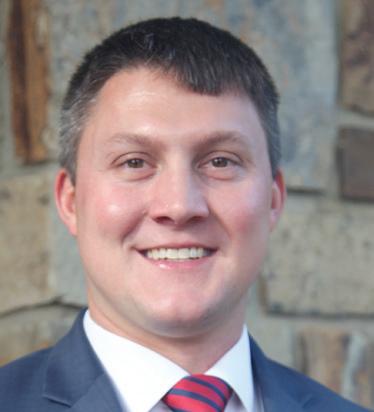
Steve said in House Resolution 1080, “I greatly appreciate the working relationship I have experienced with Buddy Johnson. He restored a collaborative spirit of working together with the Senate and the Bureau of Legislative Research that benefitted the legislative process. The House of Representatives is a better place thanks to Buddy’s humility and professionalism.”
Steve and Buddy were much more than Parliamentarians. They were mentors, counselors, and friends to the Senators and Representatives. They were loyal to their profession and the bodies they served. You know I always like to use a sports analogy. Parliamentarians are a lot like umpires; they try to make the calls by the book. These two would have been the most respected umpires in the park. You may not like their calls, but you know they will get them right. The Capitol and the people that work in the marble walls will miss Steve and Buddy.
AAC GOVERNMENTAL AFFAIRS
Josh Curtis Governmental Affairs Director
COUNTY LINES, SUMMER 2023 21
Arkansas county officials not required to purchase surety or fidelity bonds
surety or fidelity bond is defined as a three-party agreement that legally binds together a principal (the elected official) who needs the bond, an obligee who requires the bond (the county or constituents), and a surety company that sells the bond (outside bonding company). For many years the requirement to have a surety or fidelity bond for misdeeds or theft by a county official was statutorily required to be obtained for our elected county officials.
With the word limit in this space comes an oversimplification of our bonding process in Arkansas, so please know you can freely contact me if you have any questions. The federal government does not require its officers to obtain surety bonds, but many states do. Arkansas, in my opinion, made very wise moves years ago to eliminate the need for surety or fidelity bonds by relying on two major processes in our state.
First of all, surety bonds for public official activity (other than theft) are actionable by the public through our existing court system. Should an official not perform his or her duties as required by law the circuit courts in our state (or claims commission for some state actions) can provide relief through writs of mandamus or financial relief depending on the issue at hand. A writ of mandamus is simply an order from a court to a government official ordering them to properly fulfill their official duties. This system eliminates the need for one portion of coverage a surety bond would provide.
The second piece of liability that presented the need for bonding was theft. In other states this is often covered through the purchase of either a bond (could be surety or fidelity) or fidelity insurance products. Act 728 of 1987 established a cutting-edge process for all cities, counties, schools and the state itself to be automatically enrolled in

the Arkansas Self-Insured Fidelity Bond Program. This program takes a small portion of turnback from counties as an annual enrollment fee, so you and your employees are automatically covered. More information on this program can be found at www.insurance.arkansas.
Chris Villines AAC Executive Director
gov/consumer-services/risk-management/fidelity/.

Together, the court system and fidelity bond program work in concert to eliminate the need for surety bonds to be purchased. Unfortunately in 2021 legislation passed that errantly struck the exemption for all state agencies, schools, cities and counties to purchase surety bonds, but in 2023 Act 554 was passed to reinstate this exemption. There are still sections of code that have surety bond requirements in statute but these are no longer needed as a result of passing Act 554. At AAC we will work to find these sections of code and work with our legislators to eliminate them and avoid confusion.
The Self-Insured Fidelity Bond program has been an ingenious way to handle government worker theft, and AAC Board President Debbie Wise serves counties well as a member of the Arkansas Governmental Bonding Board. The limit of coverage for this program is $300,000 per occurrence with a $2,500 deductible, and several counties have unfortunately had to file claims in recent years due to theft.
With many new elected officials, the question on bond coverage has come up — and there are even some citizens’ groups insisting that you as an elected official are subject to bonds that you are not purchasing. But the reality, at least in Arkansas, is that surety or fidelity bonds are not a statutory requirement of your jobs.


We want to hear from YOU
Tell us your good news. Be sure to let us know if an aspect of county government “made news” recently in your county. Or if your county officials or staff get an award, appointment or pat on the back. We want the whole state to know about your successes and accomplishments.
Contact Communications Director Christy L. Smith at csmith@arcounties.org or Communications Coordinator Sarah Perry at sperry@arcounties.org. Or you may call us at (501) 372-7550.
AAC
A
SURETY BONDS
22 COUNTY LINES, SUMMER 2023


" Spread
And Evenly While
"
Gravel Quickly
Dumping
F or Cross Gate Trailer Information, C ontact:
Updates on Opioid Settlement funding disbursement
Story by Kirk Lane,
More than six months after the Arkansas Opioid Recovery Partnership (ARORP) distributed the first opioid settlement dollar, we are starting to see the impact of settlement funds across the state. Twenty-six men in recovery in Johnson County have been placed in sober transitional housing, preparing them to be strong contributors to their families and their communities. In Union County, the TOUCH Coalition distributed naloxone to every high school senior following the fatal overdose of a student earlier this year. Hope Movement, an organization that supports families who have lost a loved one to overdose, launched an app and case management services for families across the state. In Greene, Mississippi, Baxter, Marion, Carroll, Newton, Ashley, Desha, Madison, Clark, Miller, Sebastian, Union, and Chicot counties, community coalitions received funding for training and development. Across the
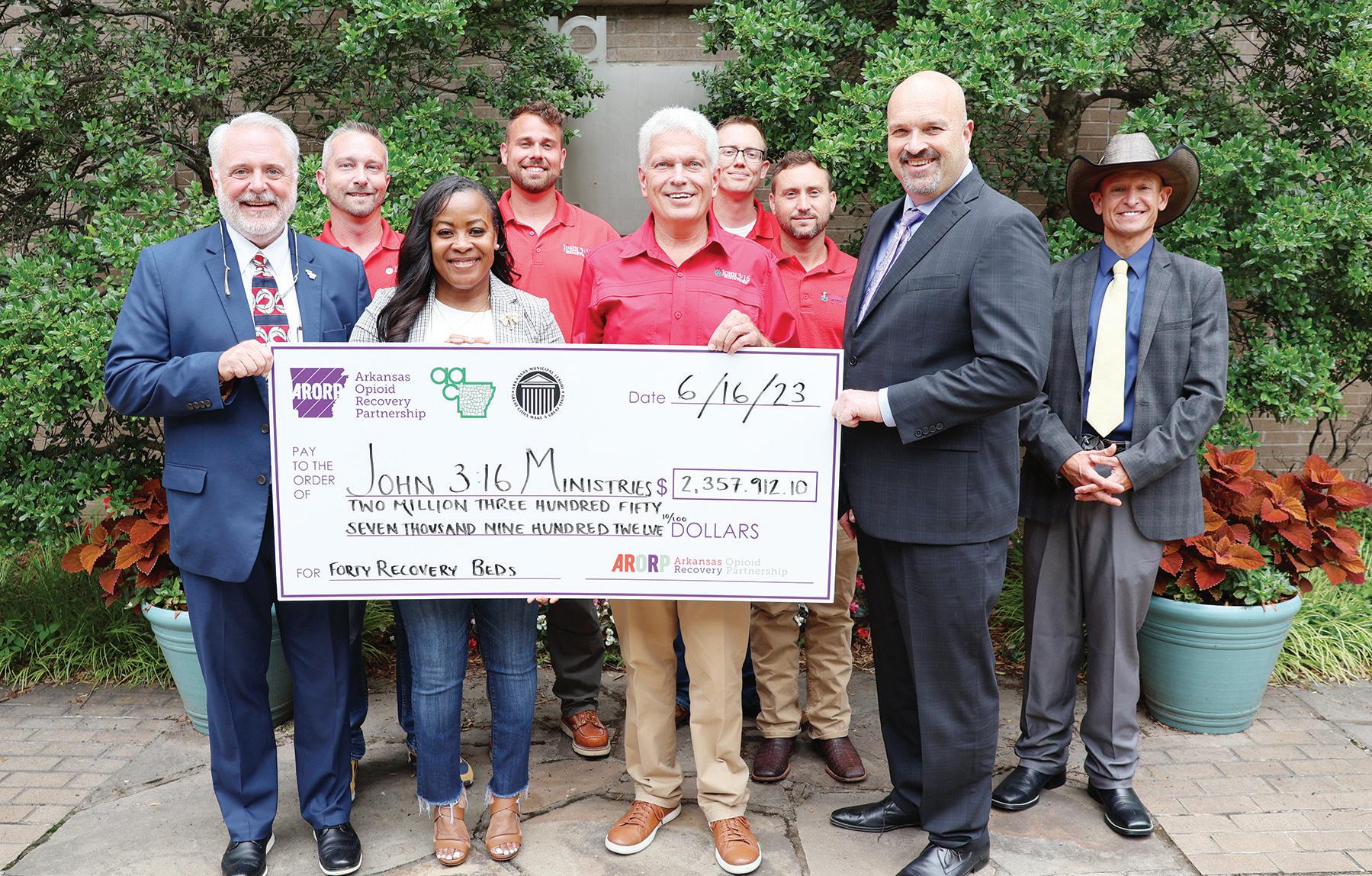 Spence
Spence
state, organizations committed to abating the opioid epidemic are stepping up to make change.
Over the next 10 to 15 years, Arkansas counties and cities will receive over $200 million dollars in opioid settlement funding. This funding will continue to be dispersed throughout Arkansas’ cities and counties to organizations that will help abate the opioid epidemic. Applications are reviewed by ARORP, an organization created by the Arkansas Municipal League (AML) and the Association of Arkansas counties (AAC) to ethically disperse funding in accordance with the settlements.
This update will show the impact of settlement dollars and ways to assist your community. If you do not see a project in your county, please encourage organizations in your area to apply for funding.
AAC ARORP UPDATE
Tenesha Barnes, Joy
& Colin Jorgensen Arkansas Opioid Recovery Partnership, AAC Litigation Counsel
Arkansas Opioid Recovery Partnership (ARORP) awarded a grant of more than $2 million to John 3:16 Ministries in Independence County. The funding will be used to purchase materials to construct 40 beds and a multipurpose room for family visits and training. Pictured are (from left to right) AAC Executive Director Chris Villines, ARORP Deputy Director Tenesha Barnes, members of John 3:16 Ministries, ARORP Director Kirk Lane, and AAC Litigation Counsel and ARORP Board Member Colin Jorgensen.
24 COUNTY LINES, SUMMER 2023
Snapshot of Applications Received (as of July 6, 2023)
• ARORP has received 127 applications for funding requesting a total of $101,010,215.01.
• ARORP has approved 60 applications for funding for a combined total of $11,494,923.39.
• ARORP has 10 projects that are in line for ARORP Advisory Board review totaling $6,849,576.12.
• ARORP has 10 projects that require additional information from the applicant totaling $7,841,687.41.
• ARORP has denied 30 applications totaling $66,503,909.53.
• Nine applicants have withdrawn their applications totaling $3,713,311.45.
Funded Projects in Your County
Each time ARORP disburses settlement dollars to a project in opioid prevention, treatment, or recovery, we turn the county where the project originated purple on the map located on our website. Our initial goal is to turn the entire state of Arkansas purple, meaning that every county has received opioid settlement funding.
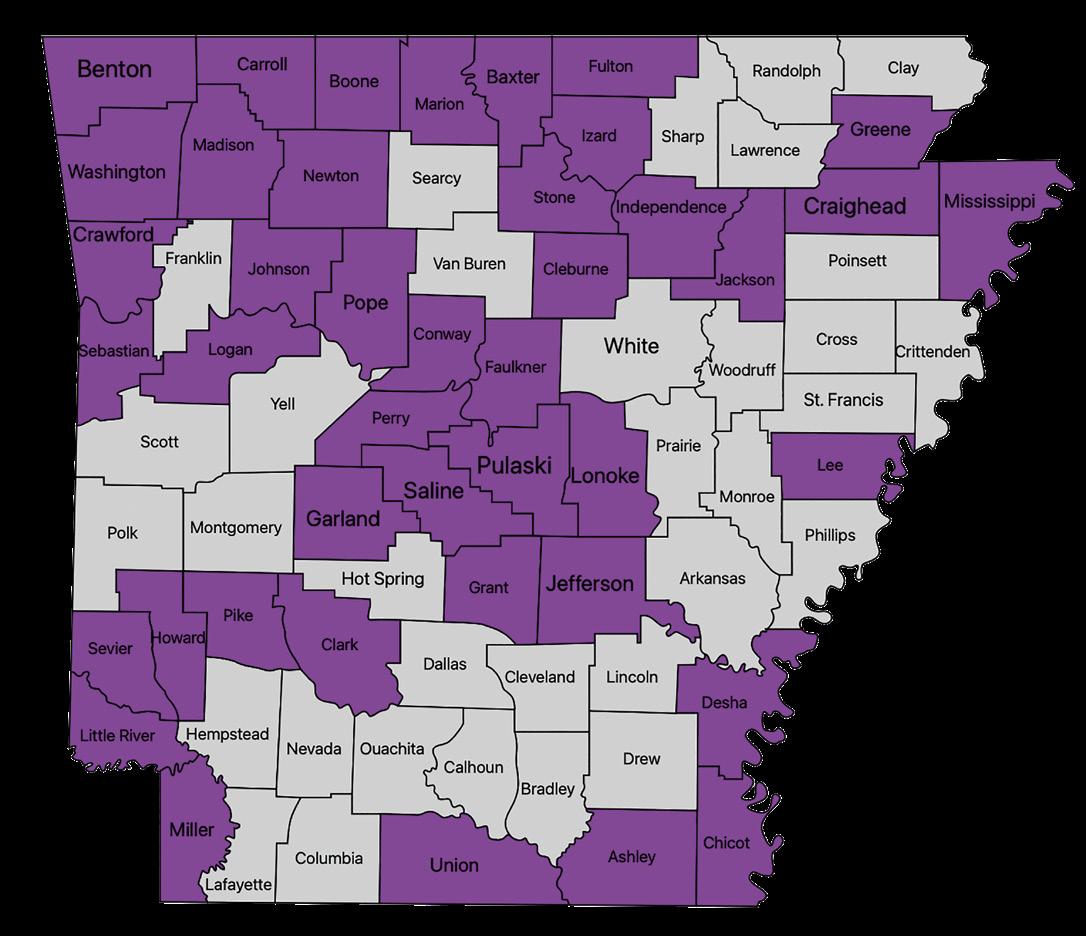
ARORP announced readiness to receive applications, and the first meeting of the ARORP Advisory Board was held on Nov. 4, 2022. Since that time, ARORP has put $11,494,923.39 opioid settlement dollars back into Arkansas cities and counties. Since our last update in the Spring 2023 County Lines, settlement funding has supported:
• Two overdose response teams in Sevier, Little River, Howard, and Pike counties (9th West Judicial District Drug Task Force/South Central) and the Benton Police Department;
• Two peer support specialist positions for the CHI St. Vincent Addiction Recovery Program;
• The purchase of materials for construction of 40 beds and a multipurpose room for family visits and training at John 3:16 Ministries (John 3:16 will provide its own labor for the construction);
• A 12-bed transitional living facility in Sebastian County — Hope’s Bridge of Ft. Smith; and
• The disbursement of over 3,500 naloxone kits (15,768 naloxone kits dispersed in total), and naloxone community trainings provided across 22 counties by Naloxone Community Heroes, including recently approved Naloxone Community Heroes:
1. Washington/Madison County Adult Treatment Drug Diversion Court (WMCATDC) — Washington and Madison counties
2. Amazing Angels Coalition — Chicot County
3. CHI St. Vincent — Pulaski County
The initial goal of Arkansas Opioid Recovery Partnership (ARORP) is to turn the entire of state of Arkansas purple, meaning every county has received opioid settlement funding. This map, which is updated regularly, can be found at www.arorp.org.
Project Spotlight: Overdose Response Teams
ARORP has an application specific to law enforcement called the Overdose Response Team (ORT). Law enforcement can apply to create an overdose crime scene team consisting of a criminal investigator and a peer recovery specialist (PRS). The investigator will work with the law enforcement agency at the scene to seek out the supplier for prosecution with assistance from the Drug Enforcement Agency (DEA) Tactical Drug Division. The PRS will provide counseling for the overdose victim on available treatment and recovery services and follow-up and tracking of these individuals to promote treatment and recovery. In cases of a fatal overdose, the PRS will refer family members to grief counseling resources. The PRS will also engage in community education about substance abuse, working with local coalitions and schools.
Four law enforcement agencies have received ARORP funding for an ORT: Hot Springs Police Department (Garland County), Craighead County Sheriff’s Office, 9th West JD Drug Task Force/South Central (Sevier, Little River, Howard, and Pike counties), and Benton Police Department (Saline County).
Project Spotlight: Hope Movement Coalition
In June, Hope Movement officially launched You Are Not Alone, a new program that offers a specialized support system
AAC ARORP UPDATE
See “OPIOID FUNDING” on Page 26 >>> COUNTY LINES, SUMMER 2023 25
OPIOID FUNDING
for families who have lost a loved one to overdose. The project was funded in January 2023 by ARORP. Losing a loved one to fentanyl poisoning, says founder Staci James, is a different experience than losing a loved one to disease or a natural disaster. With overdose, there is stigma that isolates families from seeking help. James created You Are Not Alone to bring families out of isolation and into community.

The program offers several key services. Families can enroll in an eight-week grief course tailored to overdose loss, attend a three-day grief retreat designed around empowerment, and attend monthly support meetings with others who have lost a loved one to overdose.
The program also offers key legal and financial services as well, including assistance for grandparents who will take guardianship of their grandchildren, funeral assistance for those struggling to pay for their loved one’s funeral, assistance in finding a counselor trained in grief and PTSD, and financial support for taking additional time off work. Finally, the program follows the state peer modeling, pairing new clients with peers who have gone through the same experience.
Application Opportunities
Applicants must fill out an online application at www.arorp. org/funding-opportunities/. There is no need to hire a grant writer; the application is designed to be user-friendly. The settlement funds are intended for the creation or expansion of opioid prevention, treatment, and recovery projects. The
money is not meant to replace or supplant existing funding. There are four categories of proposals. The general proposal allows flexibility for an organization to submit any project related to opioid prevention, treatment, and/or recovery. We want community leaders to assess their community’s needs, then submit a proposal to address existing gaps in services. There are three other proposal categories: Naloxone Community Hero, Coalition Partnership Empowerment, and Overdose Response Team.
Apply to be a naloxone community hero (HERO) to bring naloxone and training on its use to your community’s residents who need it most: people at risk of opioid overdose and their close friends and family members. (Please note that naloxone from ARORP cannot be distributed or sold to first responders or harm reduction groups.)

Law enforcement agencies, drug task force agencies, and local governments can submit an Overdose Response Team (ORT) proposal. An ORT partners a law enforcement criminal investigator with a peer recovery specialist (PRS) to respond to fatal and non-fatal overdoses within their jurisdiction.
Finally, community coalitions can apply for extra training through CADCA with a coalition partnership empowerment (COPE) proposal. However, this application will not be available again until 2024.
Help us turn the state purple! Encourage organizations in your area to create new projects in opioid prevention, treatment, and recovery.
UPDATE
AAC ARORP
Continued From Page 25 <<<
26 COUNTY LINES, SUMMER 2023
Above left: ARORP Deputy Director Tenesha Barnes and ARORP Director Kirk Lane present a check for more than $319,000 to Hope’s Bridge Transitional Founder Austin Coats. The funding will be used to construct a 12-bed transitional living facility in Fort Smith/Sebastian County. Above right: Director Lane and Deputy Director Barnes present a check for more than $400,000 to Benton Police Chief Scotty Hodges for the creation of a new Overdose Response Team in Saline County.
ARORP, CADCA to offer opioid training for county and city officials
Story by Kirk Lane, Tenesha Barnes, Joy Spence & Colin Jorgensen Arkansas Opioid Recovery Partnership, AAC Litigation Counsel
Many county officials are working to eradicate the impact of the opioid epidemic in their communities, but the problem can feel overwhelming. To create a system of support, ARORP has funded an international training organization to develop specialized training for Arkansas city and county leadership to aid their fight against substance misuse.
In June 2023, ARORP funded Community Anti-Drug Coalitions of America (CADCA), an international training organization that partners with Substance Abuse and Mental Health Services Administration (SAMSHA), the Drug Enforcement Agency (DEA), the Centers for Disease Control and Prevention (CDC), the U.S. Department of Education, and other prominent federal organizations to create a simple training program for Arkansas city and county employees. In this project, CADCA will develop training and resources specific to Arkansas to support Arkansas leaders’ efforts against the opioid epidemic. Participants will be shown how they can identify, access, and use community-level information and resources related to the current opioid epidemic in Arkansas to affect change. They will be trained to become leaders in community-level efforts aimed at combatting the opioid epidemic.
You may recognize CADCA from another project funded by ARORP. In the Community Coalition Empowerment Partnership project (COPE), Arkansas community coalitions can apply to ARORP for $25,000 for training and development. Thirteen community coalitions spanning 15 counties were selected for training this year.
The most recently funded CADCA project, however, will be tailored toward Arkansas’ leadership. Over the next two years, CADCA will complete four goals as a part of their proposal. First, CADCA will design and create training resources, including training curriculum, training materials, and other resources for county and city officials in Arkansas. The training content to be developed will focus on prevention, treatment, and recovery from opioids — and how Arkansas county and city officials can become leaders in combatting the opioid epidemic at community levels.
This training and its materials will be based on CADCA’s already existing substance misuse prevention training materials used for CADCA’s National Coalition Academy (NCA) and adapted to the local context of counties in Arkansas. The NCA’s coalition development curriculum is based on the Strategic Prevention Framework (SPF), which is a process of five steps conducted at the community level: (1) collect-
ing data and assessing a community’s prevention needs, (2) building a community’s prevention capacity, (3) developing a strategic plan, (4) implementing effective community prevention policies, practices, and programs, and (5) evaluating efforts for outcomes. These five steps are conducted behind the backdrop of the SPF’s two principles of sustainability and cultural competency.
After materials are developed, CADCA will work with ARORP to host training materials and other content on the ARORP website: www.arorp.org. The website will serve as an internet-based resource hub providing training resources, information, and other related materials for Arkansas county and city officials involved in combating the opioid epidemic. As a resource hub, it will reflect the Tools for Employers provided on the Together Arkansas Opioid Response Initiative website developed for the Arkansas business community. CADCA will promote the content on the ARORP website through CADCA’s own website with a link, announcement, and the ARORP logo.
To ensure the effectiveness of the training, the training curriculum and associated materials will be tested and assessed before its full implementation and delivery in the subsequent year. A group of initial Arkansas county and city officials will be invited to participate in the test training, and pre-post tests will be administered among these test participants to determine the impact of the training and materials. Any identified issues with the training and materials will be addressed for the final training delivery.
Following the development and testing of training content and materials, CADCA will then focus on the delivery of virtual and in-person training for Arkansas county and city officials. Training topics will include transformational leadership, identifying and assessing local community challenges and resources, working with other decision-makers in government, community empowerment and mobilization, team building, and tactics and techniques for establishing relationships with key sectors, including institutions, organizations, and residents for the successful development of initiatives to combat the opioid epidemic.
Dates and details for this training will be announced soon through the ARORP website and social media, as well as through emails to county and city officials. The training will be housed on ARORP’s website later this year. To receive early access information, email ARORP Data Research Manager Joy Spence at jspence@arorp.org.
AAC ARORP UPDATE
COUNTY LINES, SUMMER 2023 27
AAC RISK MANAGEMENT SERVICES
On Dec. 29, 2022, the Providing Urgent Maternal Protections for Nursing Mothers Act (PUMP Act) was signed into law. The PUMP Act updated the breastfeeding accommodations originally provided for in the Fair Labor Standards Act (FLSA). Federal law now requires that employers provide “reasonable break time for an employee to express breast milk for such employee’s nursing child for one year after the child’s birth each time such employee has need to express milk.” Duration and frequency of these breaks will vary from employee to employee considering distance from the pumping location, time to set up equipment, time to pump, etc.
In addition to providing reasonable break time, employers are required to provide a space, other than a bathroom, that is shielded from view and free from intrusion of co-workers and the public. Ways to ensure the employee has privacy include designating a room with a lock for the breastfeeding employee(s) to use or providing a sign that can be displayed when the designated space is in use. There is no requirement to have a permanent dedicated space for pumping. However, if there is not a permanent designated space, the space that is temporarily designated for use must be made available whenever it is needed by the employee in order to meet the statutory requirement.
The space you provide your employees must also be functional. The Equal Employment Opportunity Commission (EEOC) provided recent guidance stating that a functional space is one that would include a place for the employee to sit, a flat surface that is not the floor, such as a table or desk, access to electricity, and access to a nearby sink and milk storage. Please keep this information in mind when selecting your space.
With the passage of the PUMP Act, employers still are under no obligation to pay employees who are using break time at work to express breast milk unless one of the exceptions applies. The first exception to this general rule is that an employer must pay an employee for break time used to express breast milk if the employee is not completely relieved of duty. This means if an employee is still working (e.g., completing reports, returning phone calls, etc.) the employee would not be completely relieved of duty and would be paid. The second exception to the general rule is if the employee decides to use a paid break already provided by the employer to pump.
It is important to note that unlike with accommodations under the Americans with Disabilities Act, for counties and other employers who have 50 or more employees, the requirement to provide reasonable break time does not consider whether the employee’s break time would cause an
undue hardship. However, under Arkansas law, employees have a duty to make reasonable efforts to minimize disruption to the employer’s operations.

The Fair Labor Standards Act (FLSA) Minimum Wage Poster contains a section titled “PUMP AT WORK” that put employees on notice of the rights afforded to them under this Act. This poster is required to be posted in a conspicuous place accessible by all employees and should be posted in each facility location (e.g., the courthouse, employee breakrooms, the road department shop, the sheriff’s department, and the detention facility). You can find a copy of the poster on the Department of Labor’s website.
The Pregnant Worker’s Fairness Act (PWFA)
In addition to the PUMP Act, new legislation titled The Pregnant Workers’ Fairness Act (PWFA) also was passed last year. This legislation went into effect on June 27, 2023. This Act requires employers to provide reasonable accommodations to a qualified worker’s known limitations related to pregnancy, childbirth, or related medical conditions. The only exception to this law is if the accommodation would cause the employer an undue hardship. The PWFA defines undue hardship as causing significant difficulty or expense.
While it is possible to have a pregnancy related disability, the PWFA is different from the Americans with Disabilities Act (ADA) in that an employee does not have to show that the physical or mental condition is a substantially limiting impairment. Examples of conditions that would entitle an employee to an accommodation under the PWFA include morning sickness, swelling in the feet, back pain, and other pregnancy related conditions.
In determining what would be a reasonable accommodation under the PWFA, it is recommended that employers engage in the interactive process with their employees. However, unlike with the ADA, the interactive process is narrower in that a lengthy back and forth with healthcare providers may not be necessary. Examples of potential accommodations for pregnant workers provided by the EEOC are being able to sit or drink water, receiving closer parking, having flexible hours, receiving additional break time to use the bathroom, eat, and rest, receiving appropriately sized uniforms and safety apparel, being excused form strenuous activities and/ or exposure to chemicals not safe for pregnancy, and taking
Mallory Floyd RMS Employment Counsel
28 COUNTY LINES, SUMMER 2023
What’s new with pregnancy and new mother’s accommodations: what employers need to know
leave or time off to recover from childbirth.
While the PWFA went into effect on June 27, 2023, there is a six month gap in time between its effective date and the date the EEOC is required to provide guidance for employers. This means that additional information concerning how requests for an accommodation under PWFA could potentially be released in waves. Be on the lookout for any emails containing valuable information and updates that will be sent out on your listservs.
It is important to remember that the passage of the PWFA does not eliminate other laws that apply to pregnant mothers such as Title VII, the ADA, and leave under the Family
AAC RISK MANAGEMENT SERVICES
Medical Leave Act (FMLA). Providing adequate training for your supervisors about the PWFA, and the other listed laws, is key to ensuring they can effectively manage requests for reasonable accommodation. The Association of Arkansas Counties will be hosting a Supervisor Bootcamp in October and in November. The PWFA is among the topics to be discussed. If you are interested in registering your supervisors for this training, please let me know. Also, do not hesitate to reach out to me if you have questions about either of these laws and need advice on how to proceed with a request for an accommodation. I can be reached via email at mfloyd@ arcounties.org or at (501) 375-8805, extension 514.
Arkansas officials pay tribute to the late Charlie Daniels
Longtime Arkansas politician
Charlie Daniels died July 9, 2023, at the age of 83. Daniels was elected eight times by the people of Arkansas to three statewide offices. Daniels got his start in politics in 1972 when he was elected to the Parkers Chapel Board of Education. He later served as governmental relations director for the Arkansas Electric Cooperative Corp.
His career in state government began in 1975 when he was appointed by Gov. David Pryor to serve as director of the Arkansas Department of Labor, where he continued to serve under Gov. Bill Clinton.
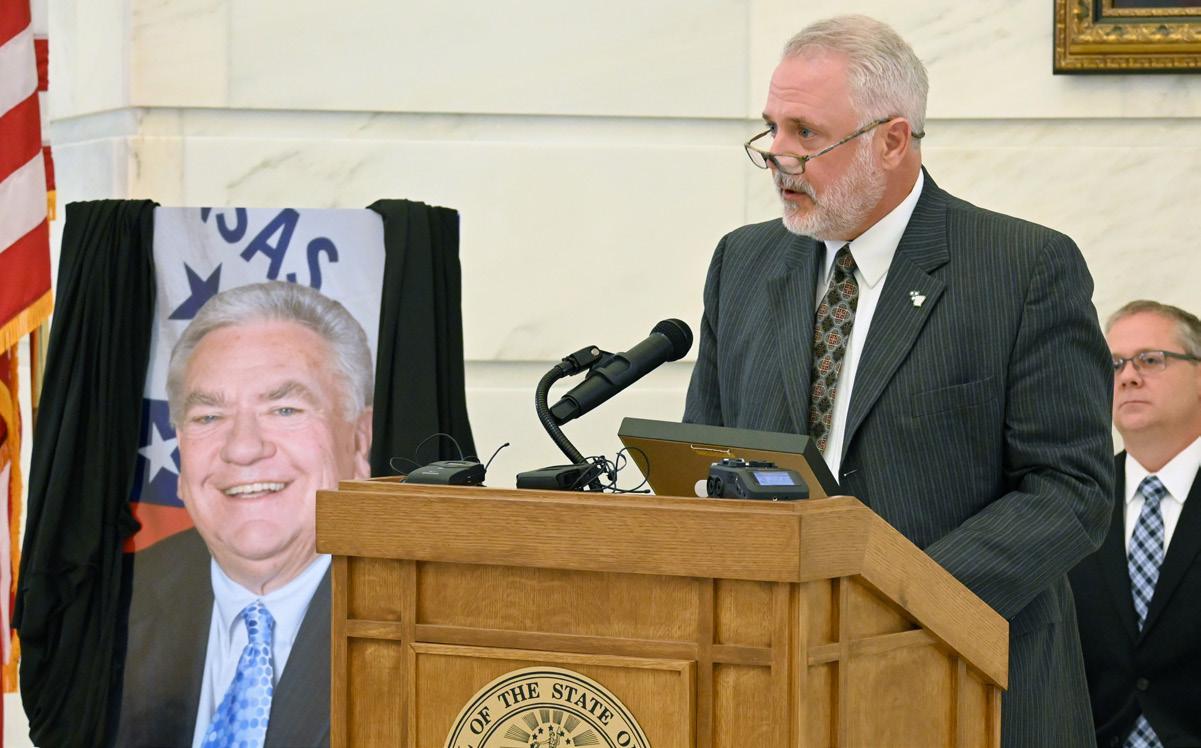
In 1984, he was elected Commissioner of State Lands. After serving in that office for 18 years, he ran for and was elected Secretary of State. He served in this role from 2003 to 2011. He finally was elected State Auditor and served in this role for four years until his retirement in 2015. On July 17, 2023, Secretary of State John Thurston hosted a memorial service in Daniels’ honor at the Arkansas State Capitol, a place that Daniels loved and where he worked for nearly four decades.
Above: AAC Executive Director Chris Villines addresses Daniels’ family before reading Gov. Sarah Sanders’ proclamation honoring Daniels’ service and ordering for the U.S. and Arkansas flags to be flown at half-staff “as an expression of public sorrow.”
Left: Winthrop Rockefeller Institute Executive Director Janet Harris reminisces about her experiences working with Daniels. Like many who spoke at the memorial service, Harris shared about Daniels’ love of the Arkansas State Capitol and how he and his staff took great pride in taking care of the building and grounds. Harris also noted that Daniels campaigned as a Democrat, but was willing to help all Arkansans.

COUNTY LINES, SUMMER 2023 29
Story and Photos by SARAH PERRY AAC Communications Coordinator
Jails see progress with Guardian system AAC MEMBER SERVICES
Ihave said for years, one of the most challenging jobs in law enforcement is working in, managing, maintaining, and overseeing a county jail. In my opinion, sheriffs across the state of Arkansas are incredibly fortunate to have some of the most dedicated, talented, and professional jail administrators in the country. One of the many member benefits provided by the AAC Risk Management Fund is the Guardian inmate tracking system for detention centers. From inmate welfare checks to the logging of meals, medications, legal mail, and inmate supplies, the Guardian system can assist in eliminating the need of paper logs to document many constitutional duties within your facility and help you achieve facility compliance in accordance with state standards. When faced with litigation from a facility utilizing Guardian to its full capabilities, records are readily available at the touch of the fingertips as opposed to having someone dig through hundreds if not thousands of pieces of paper looking for specific dates
and persons, saving everyone time and money. Over the last few months, there have been significant compliance improvements made in multiple counties across the state. I reached out to Conway County Jail Administrator Shane West and Van Buren County Jail Administrator Jamie Love to find out just how they were able to see increases of 30 to 50 percent in a short amount of time. From incentives to focused responsibilities, they found ways to assist their employees in finding success using the Guardian system to their advantage. I asked both of them to share their success stories in hopes that others who may be struggling find this informative and resourceful.
When I became jail administrator on Jan. 1, 2023, the sheriff and I set a goal to get the jail in compliance with Jail Standards. When we started, our compliance was in the 20th percentile. For us, utilizing the GuardianRFID system was the most useful and simple way to start achieving that goal. The biggest complaint from my jail staff was all the repetitive paperwork they were doing. We removed dispatch from the jail and the only job of the jailers now is to maintain the safety of the facility and the detainees. I reached out to Guardian and requested training for my jail staff; only two jail staff members had ever had Guardian training at the time. Chris with Guardian spent two or three days with the jail staff. We changed several things to make Guardian more compatible with our facility and the things we were doing. We set the alarm times to give us more of a heads up so we wouldn’t be late. We did struggle in the beginning because, lets just face it, we all get set in our ways. So, getting used to a new normal was hard on the jail staff who hadn’t been using it. Everyone stepped up, myself included, to make sure the scans were being done accurately, timely and efficiently. Each shift began to hold each other accountable and started communicating that scans were due in so many minutes. Now, when we train new jail staff, the very first thing we do is train on the Guardian system. My No. 1 rule is when you set foot on the jail floor, the Spartan must be in your hand. Our goal with Guardian is to get rid of some of the repetitive paperwork by July of this year. Through the changes we have implemented, as well as making training on Guardian a priority, I am proud to say that our compliance is now consistently above 70 percent. This is only the beginning for us, and we plan on being in the 90th percentile in the near future.
Jamie Love Van Buren County Jail Administrator
JAMES MIRUS Member Services Manager

30 COUNTY LINES, SUMMER 2023
05.26.2023
Doing hourly cell checks/scans is one of the most important tasks the jail staff does every day. I think every jail administrator would agree with this statement. I think every jail administrator would also agree that it is a challenge to get detention officers to understand how important these checks are to the facility.
Since we started using Guardian several years ago, it has been an up and down struggle to get our staff to be consistent with getting the scans done without going into the red (late). Part of this is because of employee turnover and trying to get new officers to understand why these checks are important. Here at the Conway County Detention Center, we have always struggled to maintain anything over 70 percent compliance each month through the last several years. This is something my sheriff and I have worked on to figure out how to get our numbers above no less than 80 percent compliance every month. As we set that goal, we have challenged the staff to not only get above 80 percent but to maintain above it and continue to improve our numbers every month. The question I had, was how can we turn our compliance around and be a leader among the jails across Arkansas?
At the end of 2022, I had many conversations with Chris Reidmueller who was a fellow jail administrator in Faulkner County but now works for Guardian. We went through our numbers to find where our jail could make improvements. What we found was that only a few officers were doing the majority of the checks and other staff was not helping. We were able to see that some officers would go a whole shift without doing any checks/scans at all.
So, over the first five months of 2023, our facility went from 60 percent compliance to over 90 percent compliance every month. I was asked by the AAC how this turnaround happened so fast. It has been a total team effort by all detention officers being accountable and buying into getting these checks/scans in before we were in the red.
I began looking at each officer’s individual daily check/scans and began having conversations with them about how it is everyone’s responsibility to help get the checks/scans done on time. We also put up a dedicated monitor in the control pod so that all officers would see when a check/ scan needed to be done. The monitor volume is turned up so everyone can hear the 5-minute warning as well as when the siren sounds that the scans/checks are in the red. The officers hate that annoying alarm when the monitor goes into the red. This alone has helped us keep the checks/scans from turning red. We also started giving out incentives like gift cards to the officers who are doing the most scans each month. This motivated other officers to step it up and do more checks/scans. I have been shocked how competitive this has gotten between the officers. Officers come ask me every day who did the most scans for the day. Also, I have rewarded all the shifts with meals/snacks, and I just keep reminding them about the importance of the check/scans. Now that we are about to enter June 2023, it feels like it is becoming muscle memory, and I do not find myself telling staff that the checks/scans are about to be in the red.
I am proud when I am asked how our jail went from 60 percent to 90 percent. I just say that if you can get your staff to buy into it, the numbers will show what works.
Shane West Conway County Jail Administrator
AAC MEMBER SERVICES
COUNTY LINES, SUMMER 2023 31
The NACo High Performance Leadership HPLA uses an innovative, interactive online learning platform that combines real-time webinars, recorded county – saving money and maximizing time.

THE ACADEMY FOCUSES ON FIVE ESSENTIAL SKILLS:
COMMUNICATE: COLLABORATE: ORGANIZE: DELIVER: LEAD:
Engage teams and stakeholders to foster positive climates and exceed common expectations
Plan, lead and execute organizational change more consistently
Establish alignment and strong partnerships through building stronger relationships
Measure projects and processes to deliver results aligned with county and community priorities
Create clarity, confidence and community
The NACo High Performance Leadership Academy empowers frontline county government professionals with fundamental, practical leadership skills to deliver results for counties and residents.
NACo Member County cost per enrollee begins at $1,995
Additional discounts may apply. Contact us for more details.
With a curriculum developed by General Colin Powell and public and private sector leaders, NACo High Performance Leadership Academy gives students the opportunity to learn from world-class faculty. All content is guided by an expert facilitator.

Find out more at NACo.org/Skills
AAC names 2023 scholarship recipients
Students will study computer science, education, medicine and more.
The Association of Arkansas Counties has announced its 2023 AAC Scholarship Trust recipients. AAC established the trust in 1985 to provide college financial assistance to the children, stepchildren and grandchildren of Arkansas county and district officials and employees. AAC has since awarded more than a quarter of a million dollars in scholarships. In the past, the scholarships have been for $1,500. This year, the AAC Board of Directors raised that amount to $2,000.
Along with the AAC, these associations contributed to the scholarship trust in 2023: the County Judges Association of Arkansas, Arkansas Circuit Clerks Association, Arkansas County Treasurers Association, Arkansas County Clerks Association, Arkansas Coroners Association, Arkansas Association of Quorum Courts, Arkansas Sheriffs Association, Arkansas County Tax Collectors Association, and Arkansas County Assessors Association.
Alaina Burns — Alaina is a 2022 graduate of the University of Arkansas at Monticello. She is now pursuing a medical degree at the University of Arkansas for Medical Sciences. She is the daughter of Tracy Glover, who works in the Bradley County Circuit Clerk’s Office.
Olivia Lexanna Moore — Olivia is a 2023 graduate of Harmony Grove High School. She is the daughter of Kim Moore, who is the jury coordinator in the Saline County Circuit Clerk’s Office. She plans to attend Ouachita Baptist University to study biology on her path to become a veterinarian.
Elliot Allen — Elliot is a freshman at Hendrix College, where he is studying computer science. He is the son of Scotta Allen, who is the chief deputy treasurer in the Crittenden County Treasurer’s Office.
Lexie Ruth Freeman — Lexie is a sophomore at the University of Arkansas at Monticello, where she is pursuing a degree in accounting. She is the granddaughter of Arkansas County Treasurer Stacey Breshears. Lexie works as a part-time deputy treasurer.




Melody Raymick — Melody is a 2023 graduate of Rison High School. She is the granddaughter of Cleveland County Judge Jimmy Cummings. She plans to attend Southern Arkansas University to pursue a degree in elementary education.

AAC FEATURE
Alaina Burns
Lexie Ruth Freeman
Melody Raymick
See “SCHOLARSHIPS” on Page 34 >>
Elliot Allen
COUNTY LINES, SUMMER 2023 33
Olivia Moore
SCHOLARSHIPS
Eva Richardson — Eva is a junior at the University of Mississippi, where she is pursuing a degree in exercise science (pre-med). Her grandmother, Catherine Richardson, served as Bradley County Circuit Clerk for 20 years
Jasmine Trejo — Jasmine is a freshman at Arkansas Tech University, where she is pursuing a degree in business management administration. She is the daughter of Sylvia Trejo, who works in the Benton County Finance Department.

Kaylee Trejo — Kaylee is a junior at Barnard College of Columbia University in New York, where she is pursuing a degree in sociology. She is the daughter of Sylvia Trejo, who works in the Benton County Finance Department.


Brooklyn Waller — Brooklyn is a junior at the University of Arkansas, where she is studying nursing. She is the daughter of Angie Drummond, who works in the Saline County Judge’s Financial Management Department. Brooklyn also has previously worked part-time for the county.



Andrea Shearer — Andrea is the recipient of the Randy Kemp Memorial Scholarship. She is a 2023 graduate of Yellville-Summit High School. Andrea plans to attend Arkansas State University at Mountain Home. Her mother, Catherine Seals, works as a deputy clerk in the Marion County Circuit Clerk’s office.
Randy was the first AAC Communica-
tions Director, serving from July 2008 until his death in August 2011. The scholarship is funded exclusively by the annual Randy Kemp Golf Tournament.
Reagan Counts — Reagan is the recipient of the Matt Morris Scholarship. She is a 2023 graduate of Cave City High School. She plans to attend Arkansas State University to earn a bachelor’s degree in exercise science before pursuing a doctoral degree to become a physical therapist. Her father is Sharp County Sheriff Mark Counts.
The Matt Morris scholarship was established following the death in 1999 of Matt Morris, son of former Searcy Mayor David Morris, who is a former
FEATURE
AAC
Jasmine Trejo
Kaylee Trejo
Andrea Shearer
Reagan Counts
Brooklyn Waller
Continued From Page 33 <<<
34 COUNTY LINES, SUMMER 2023
Eva Richardson
AAC employee. Matt was an Arkansas Razorback baseball recruit. The scholarship is funded by donations made in Matt’s name and by the County Judges Association. It is awarded each year to an applicant who reminds the scholarship committee of Matt, either through their sports involvement or by helping others.
Memorial Scholarship. She is a freshman at Arkansas State University at Mountain Home, where she is pursuing a degree in elementary education. Her mom, Pam Guiltner, works in the Fulton County Clerk’s office.

Jonathan was a staff attorney at the AAC and the liaison to the Quorum Court Association when he tragically passed away. The Arkansas Association of Quorum Courts established this scholarship in Jonathan’s memory to be awarded each year to a deserving student.

Kade Ivy — Kade is the recipient of the Greg Ray Memorial Scholarship. He is a 2023 graduate of Searcy High School. He plans to study business at the University of Arkansas at Rich Mountain. Both of his grandparents, Willie Faye and Paul Ivy, have worked for Stone County for more than 20 years. Willie Faye has been the Stone County judge’s secretary for 24 years, and Paul works at the county yard.
The Greg Ray Memorial Scholarship was established to honor the legacy of former Sevier County Judge Greg Ray, who passed away suddenly in August 2022. Ray, an avid fisherman and hunter, was an active member of the County Judges Association of Arkansas (CJAA). The scholarship is funded by the Greg Ray Memorial Fishing Tournament and awarded by the CJAA.

AAC FEATURE Order Your 2022 Arkansas County Compliance Guide Today! COST IS $75 EACH Go to “Directories and Guides” at WWW.ARCOUNTIES.ORG TO PLACE YOUR ORDER.
Samantha Guiltner — Samantha is the recipient of the Jonathan Greer
Kade Ivy
COUNTY LINES, SUMMER 2023 35
Samantha Guiltner
Darter recognized during conference
Faulkner County Clerk is 2023 recipient of Wes Fowler Award
Story by Christy L. Smith
Photos by Christy L. Smith & SARAH PERRY AAC Communications Staff
Faulkner County Clerk Margaret Darter was awarded the 2023 Wes Fowler Advocacy Award from the Association of Arkansas Counties (AAC) during its annual conference.
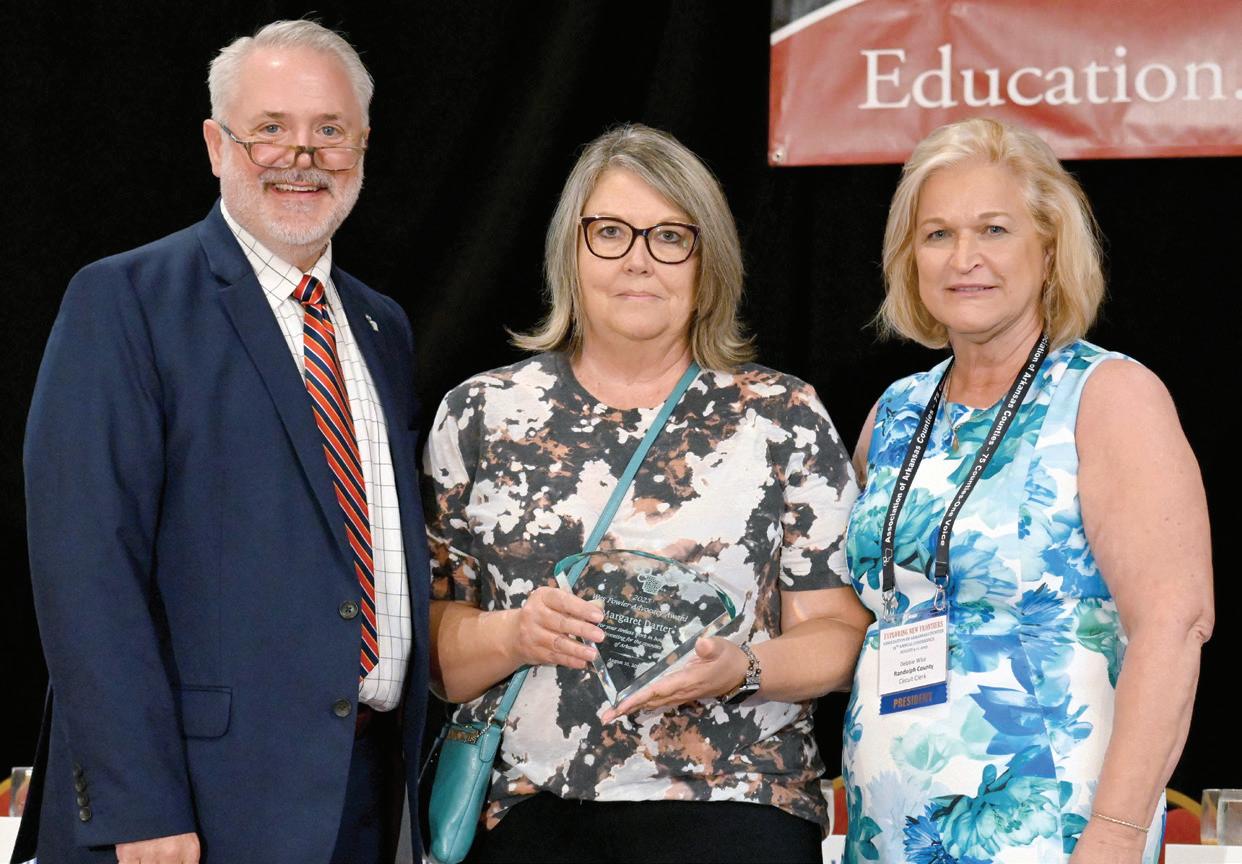
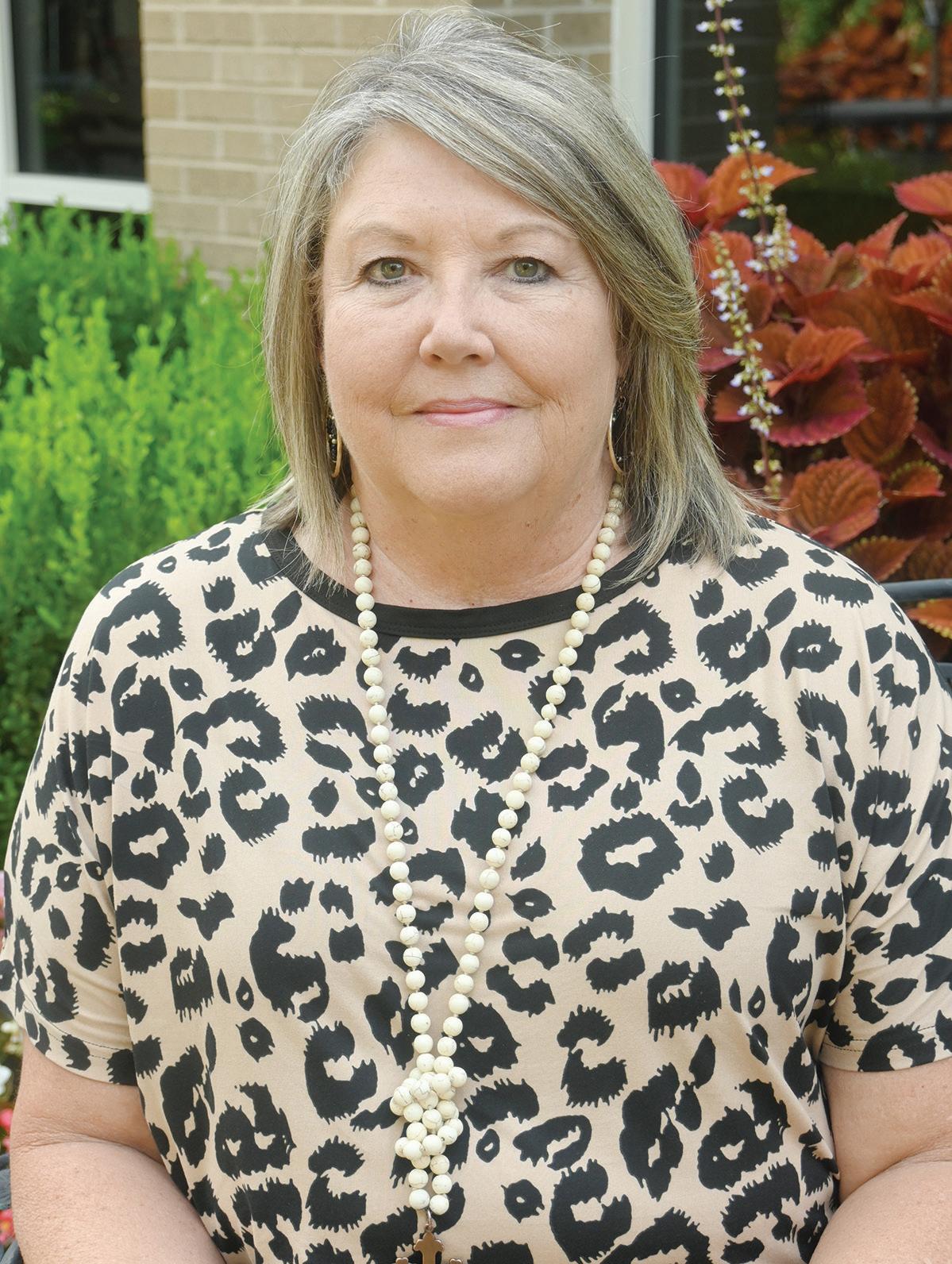
“I am humbled and honored to receive such a distinguished recognition,” Darter said in a news release. “I would like to thank my staff, Election Coordinator Laura Wiles, and all those that worked so hard while I was away from the office at the Capitol. It is a privilege and honor to serve as the Faulkner County Clerk, and I cannot express my thanks and gratitude enough.”
Darter worked as a deputy county clerk for three years before being elected county clerk in 2014. Now in her fourth term, she has exhibited leadership capability on many fronts. For instance, she implemented a shift from voting precincts to voting centers, including a roving voting center. Additionally, Darter has created further government transparency with cloud-based financial software accessible to all county departments and justices of the peace. She also has expanded her office to include the issuance of passports.
Darter is an active member of the Arkansas Association of County Clerks, serving as second vice president and
on the continuing education board. She also has become involved in advocating on behalf of her fellow county officials at the Capitol.
“In the 2023 legislative session, elections were the subject of countless bills,” AAC Executive Director Chris Villines said. “Margaret advocated above and beyond what is expected of any official. County clerks were at the Capitol often, but none as much as Margaret. She was a permanent fixture in the State Agencies committee room as she expressed county clerk positions on numerous bills.”
Her experience overseeing, along with the Faulkner County Election Commission, a recount in a close state representative race during the 2022 election was no doubt an asset.
“Margaret’s experience in a tough race in Faulkner County, and her leadership during a recount which legitimized the election was unprecedented, and offered valuable testimony to the legislature,” Villines said.
In a news release, Faulkner County Judge Allen Dodson expressed that same sentiment.
“Her work with our Election Commission during the past election proved invaluable,” he said. “All eyes in the state were on our county during a close recount. Margaret and her office rose to the occasion and provided a great example for others throughout our state. We’re proud of her and her entire staff for helping to make Faulkner County a great place
AAC FEATURE
Left: Faulkner County Clerk Margaret Darter quickly stepped into leadership roles when she took office in 2015. Above: AAC Executive Director Chris Villines (left) and AAC Board President Debbie Wise (right) present Darter with the Wes Fowler Advocacy Award during the AAC’s 55th Annual Conference, held in Rogers/ Benton County.
36 COUNTY LINES, SUMMER 2023
to work and live.”

Dodson also underlined the importance of the role Darter’s office plays in the county.
“Margaret and her staff have been an integral part of our county government,” Dodson said. “Most people don’t appreciate the breadth of knowledge needed by a county clerk. Margaret is called upon to be an expert in payroll, county purchasing, elections, probate, and marriage licenses for the fifth most populous county in Arkansas. It’s a tall task that often doesn’t get the respect it merits.”
The Wes Fowler Advocacy Award was established in 2017 following the death of Fowler, who spent decades working in Madison County government before finishing his career as the AAC’s Government Relations Director. The annual award recognizes the county or district official who best embodies Fowler’s dedication to local government and demonstrates tireless work in boldly advocating for the counties of Arkansas.
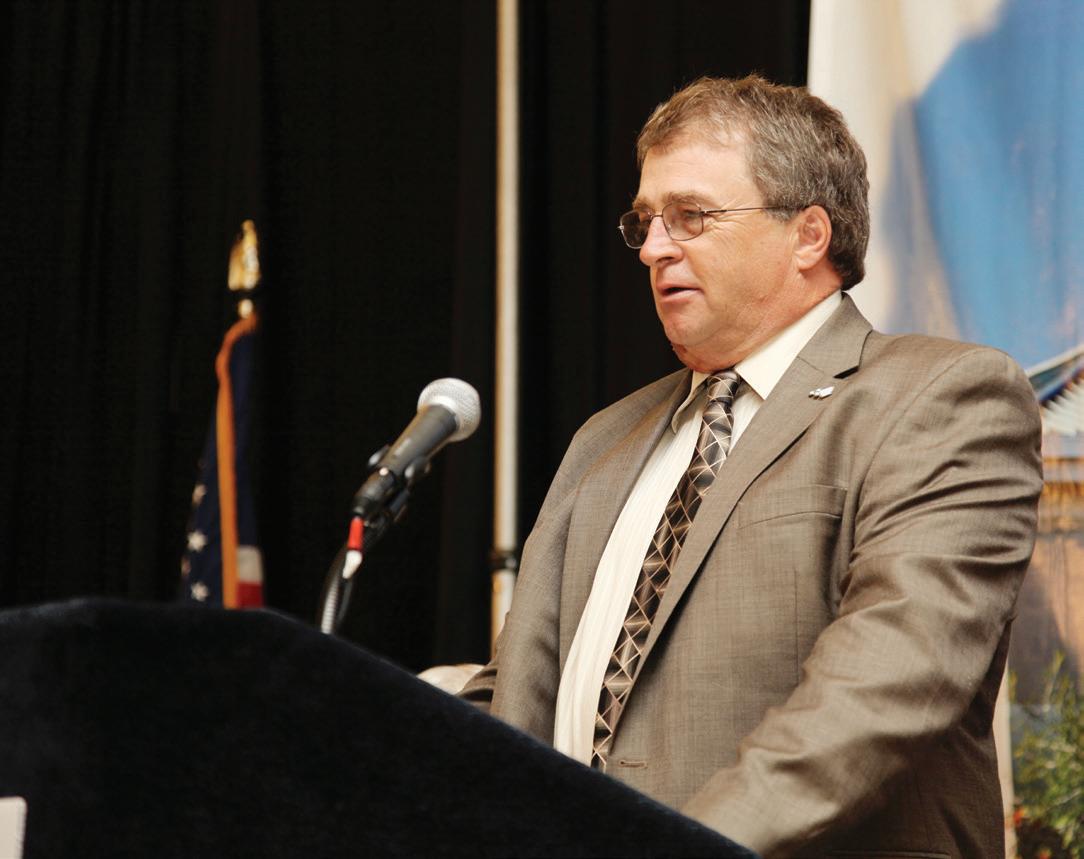
Past recipients of the award include retired Columbia County Clerk Sherry Bell, former Randolph County Treasurer and AAC Executive Director Eddie Jones, retired Madison County Judge Frank Weaver, retired Washington County Sheriff Tim Helder, Conway County Judge Jimmy Hart, and Benton County Circuit Clerk Brenda DeShields.
Above: Wes Fowler served as Madison County Clerk for 10 years beginning in 1989. During that time, he served as legislative chair and in officer positions in the Arkansas Association of County Clerks. He was elected county judge in 1998 and continued to be active in the County Judges’ Association of Arkansas. He joined the AAC staff as Governmental Affairs Director in 2010, and continued to serve as a consultant to the AAC after he retired in 2014. Fowler passed away Feb. 1, 2017.
AAC FEATURE
COUNTY LINES, SUMMER 2023 37
Officials explore new frontiers
55th Annual AAC Conference attracts more than 850

The Association of Arkansas Counties (AAC) held its 55th annual conference Aug. 9-11, 2023, at the Rogers Convention Center in Rogers/Benton County. “Exploring New Frontiers” was the theme for the event, which drew more than 850 attendees and exhibitors.
Randolph County Circuit Clerk and AAC Board President Debbie Wise presided over the event. The Wednesday opening session featured the posting of colors by the Arkansas Sheriffs Association Color Guard followed by patriotic songs by Miss Dogwood Kennedy Holland. Gov. Sarah Huckabee Sanders and Attorney General Tim Griffin addressed guests via video, and Benton
County Judge Barry Moerhing welcomed attendees to his county. Speakers included Congressman Steve Womack and National Association of Counties (NACo) Immediate Past President Denise Winfrey.
The nine associations that fall under the AAC umbrella met after the opening session. Many groups adjourned early to attend the joint meeting of the Senate and House City, County, and Local Affairs committees. The evening ended on a traditional note — with the Southern Fish Fry.
Thursday morning began with the Wellness Walk led by AAC Litigation Counsel Colin Jorgensen. Leadership was a theme throughout the conference with Admiral Peter Cressy, director of executive leadership programs at the Washington Presidential Library at Mount Vernon, serving as speaker during the Thursday morn-
ing general session as well as during a breakout session.
Other breakout sessions focused on cybersecurity issues and the 2024 solar eclipse. In addition, there was a legislative roundtable, a special breakout session for justices of the peace, and jail track trainings for sheriffs and jail personnel.
Motivational Speaker and Comedian Larry Weaver entertained and encouraged attendees at the Thursday luncheon, during which scholarship recipients, golf tournament winners, and the 2023 Wes Fowler Advocacy Award winner were announced. The evening ended with a dinner and dance, dubbed “COUNTrY AND WESTERN SHIN DIG,” featuring The Ultimate Garth Brooks Cover Band — Shawn Gerhard. Hunter Yurachek, vice chancellor and director of athletics for the University of Arkansas, closed the conference Friday morning.
AAC board members are all smiles while AAC Executive Director Chris Villines conducts the roll call at the opening general session.
Story by Christy L. Smith
Photos by SARAH PERRY & Christy L. Smith
AAC COVER STORY 38 COUNTY LINES, SUMMER 2023
AAC Communications Staff
Above left: Miss Dogwood Kennedy Holland serenades the crowd with two patriotic songs during the opening general session. Above right: Lines of attendees wait to receive their nametag, program and goodie bag at the start of registration. Left: Elected officials from Phillips County pose for a picture with NACo Immediate Past President and Commissioner for Will County, Illinois, Denise Winfrey. Pictured in the back row, from left are retired County Clerk Linda White-Winfield; Justice of the Peace Betty Brimley; Becky Hall, wife of County Judge Clark Hall, and Coroner Earnest Larry. In the front row are County Clerk Shakira Winfield, Winfrey and Treasurer Santresa Mayfield.





COUNTY LINES, SUMMER 2023 39
Above left: While donning his western wear, AAC Legal Counsel Colin Jorgensen calls bingo during the spouse program. Above right: Shawn Gerhard and The Ultimate Garth Brooks Cover Band perform during the COUNTrY AND WESTERN SHIN DIG themed dinner and dance.
AAC COVER STORY
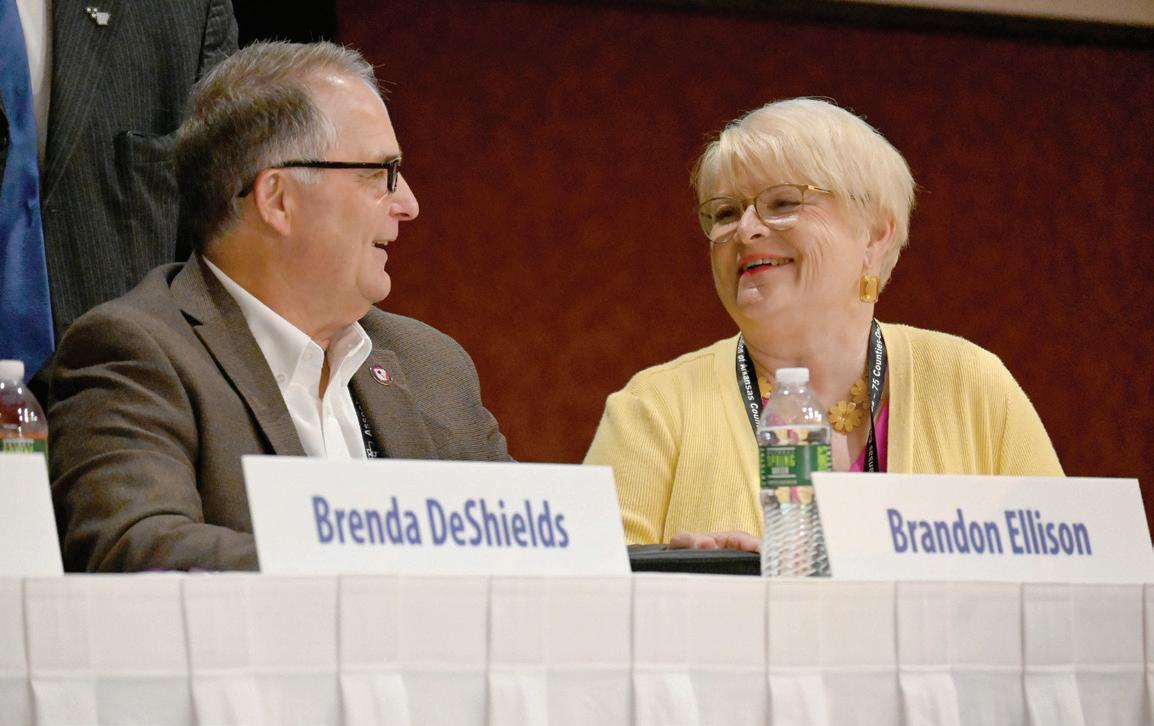





AAC COVER STORY
Left: AAC Board Members Polk County Judge Brandon Ellison and Pulaski County Treasurer/ Collector Debra Buckner chat prior to the opening general session.
Above left: The Arkansas Sheriffs Association Color Guard post the colors. Above center: Richard Hibbits, husband of White County Treasurer Janet Hibbits, looks at his bingo card during the spouses’ program. Above right: Crittenden County Justice of the Peace Lisa O’Neal poses a question to Congressman Steve Womack following his presentation.
40 COUNTY LINES, SUMMER 2023
Above left: AAC Premium Analyst Kim Mitchell poses for a picture while waiting for the vendor giveaway announcements in the exhibit hall. Above right: Hunter Yurachek, vice chancellor and director of athletics at the University of Arkansas in Fayetteville, takes a picture with AAC Board President Debbie Wise and AAC Executive Director Chris Villines.
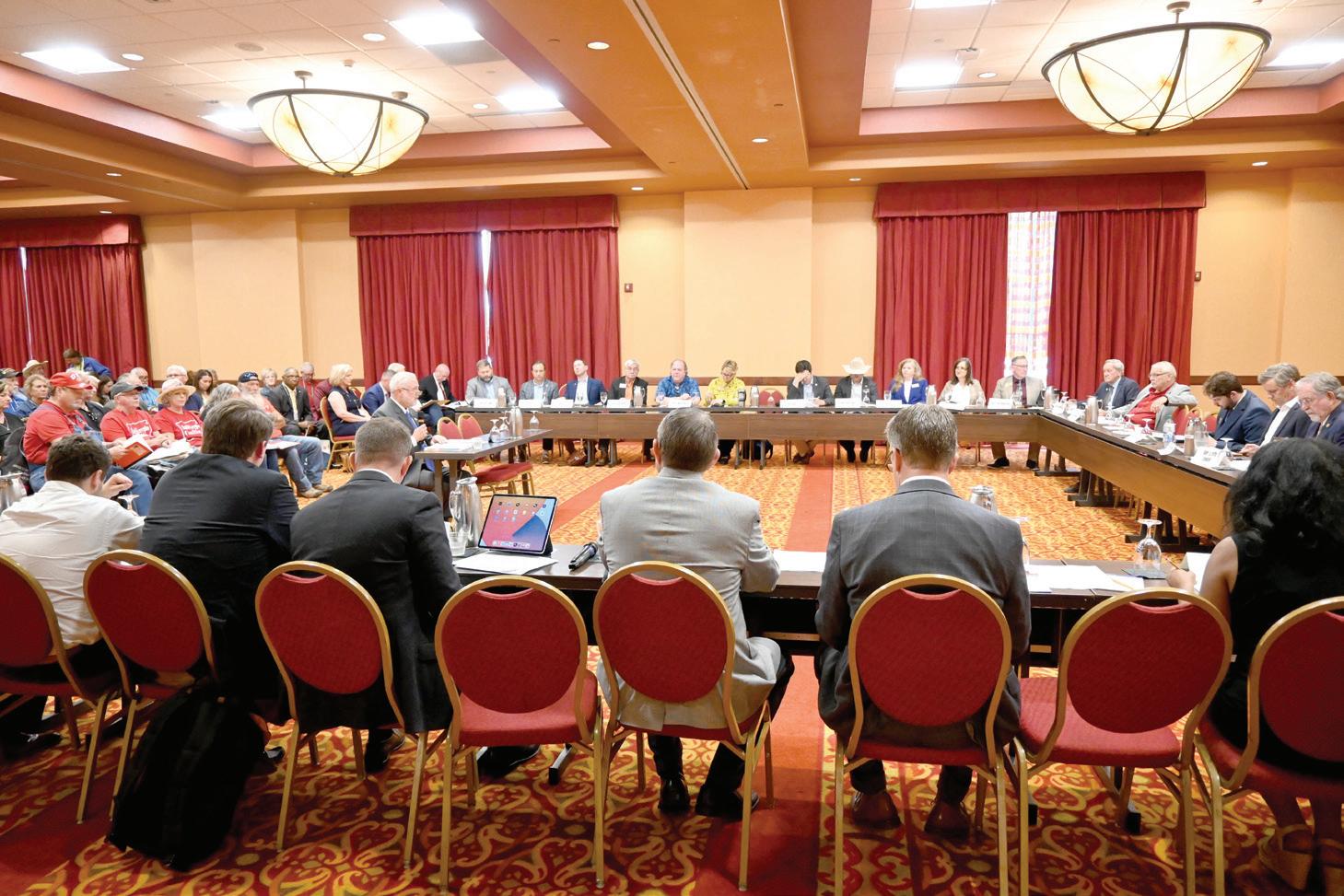




AAC COVER STORY
Above left: The Senate and House City, County and Local Affairs committees meeting was well attended with the main talking point being a recent change in the law revolving around cyptomining companies. Above right: Motivational speaker Larry Weaver uses jokes about his family and upbringing to connect with attendees. Left: Saline County officials give an excited response during the roll call at the opening general session.
COUNTY LINES, SUMMER 2023 41
Above: Jason Owens, county attorney at Jason Owens Law Firm, speaks with justices of the peace during a breakout session for quorum court members. Right: Using the words and actions of founding fathers, Admiral Peter Cressy shares tips for being a good leader.


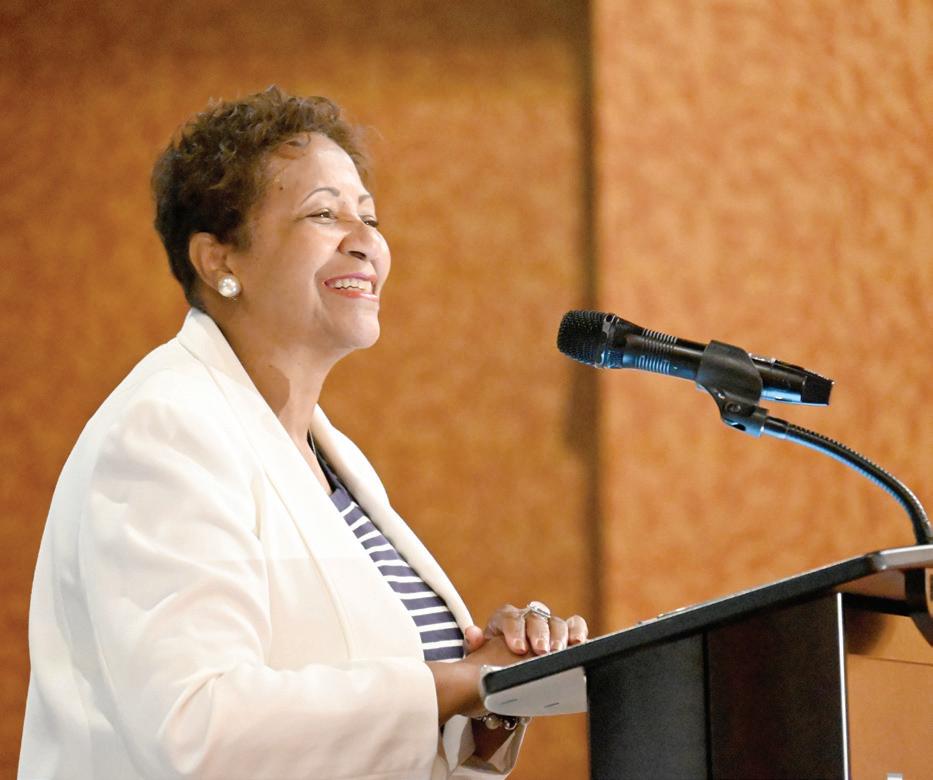
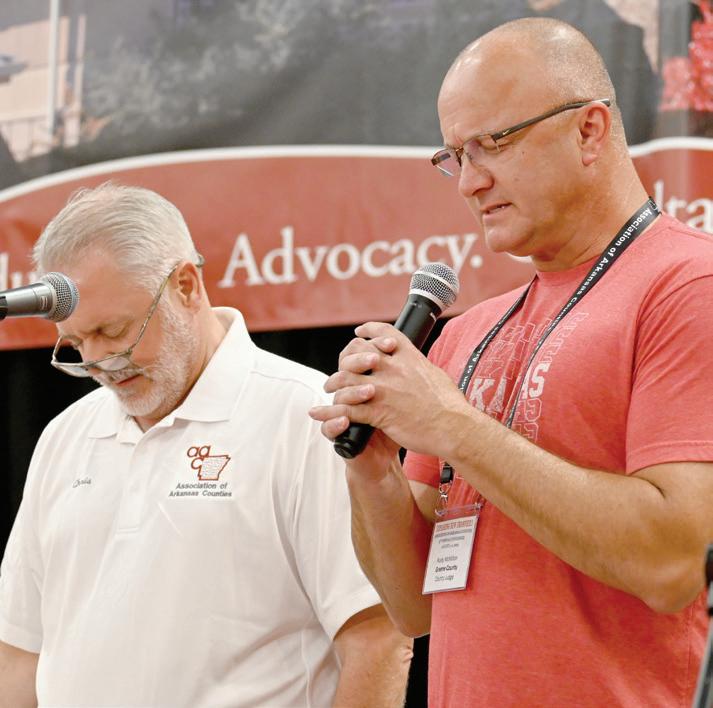


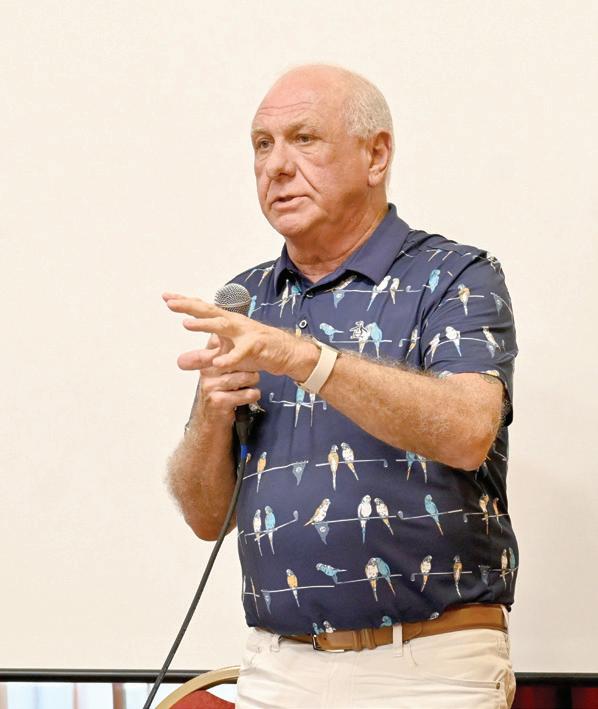
AAC COVER STORY
Left: AAC Board President Debbie Wise welcomes everyone to the 55th Annual Conference during the opening general session. Right: Ashley County Assessor Beth Rush and AAC Board Member and Stone County Assessor Heather Stevens chat with an exhibitor during the vendor hall giveaway announcements.
Above left: Gary Vance, chief information security officer for the Division of Information Systems, speaks during a breakout session about cybersecurity issues. Above center: Brenda Phillips, Marilyn Nichols and Jo Cole are engaged in an exciting game of bingo.
Above right: Greene County Judge Rusty McMillon, right, leads a prayer to bless the food before the Southern Fish Fry. Also pictured is AAC Executive Director Chris Villines.
42 COUNTY LINES, SUMMER 2023
Above left: Ashtyn Barbaree and Jacob Campbell serenade the crowd during the Southern Fish Fry. Above right: NACo Immediate Past President and Commissioner Denise Winfrey is all smiles while speaking during the opening general session.





AAC COVER STORY
Above left: Congressman Steve Womack tells of his recent meeting with American and Ukraine troops. Above right: Jack Ryan, an attorney and co-director of the Legal and Liability Risk Management Institute, leads one of the Jail Track sessions. During the conference, Ryan led two sessions for sheriff and jail personnel about choke holds and use of force. Left: Arkansas County Judge Eddie Best is all smiles while visiting with Pam Miesner and John Teagle with BHC Insurance.
COUNTY LINES, SUMMER 2023 43
Above: Chicot County Justice of the Peace Danita Turner, left, and Monalisa Alexander participate in the spouses’ charcuterie class. Right: Van Buren Justice of the Peace Mike Bradford talks with Mainsteam Technology President John Burgess in the Mainstream Technology booth.
AAC hosts Randy Kemp Memorial Scholarship Golf Tournament
Sixty-one golfers teed off at The Creeks in Cave Springs on Aug. 8, 2023, to raise money for the Randy Kemp Memorial Scholarship Fund.
Kemp was the AAC’s first communications director. He joined AAC in 2008 after a successful career in newspapers. He died in a motorcycle accident in August 2011.
The golf tournament raises funds for scholarships for descendants of county officials or employees who intend to pursue a college degree in communications or a communications related field.


The 2023 Randy Kemp Memorial Scholarship was awarded to Andrea Shearer, who plans to attend Arkansas State University at Mountain Home. Her mother, Catherine Seals, works in the Marion County Circuit Clerk’s Office.
AAC extends its appreciation to those who support the fund, the golfers and sponsors.
Left: Jefferson County Collector Tony Washington, left, and Cory Scott look at their ball as they plan their next putt.
AAC COVER STORY 44 COUNTY LINES, SUMMER 2023
Above: AAC Government Affairs Director Josh Curtis, left, presents David Rivera of Apprentice Information Systems, with a door prize.
Tournament results
First Flight
1st - Josh Longmire & Richard Rogers
2nd - Kyle Sylvester & Robert Hudson
3rd - Reid Hall & Kevin Tucker
Second Flight
1st - Bob Ramsey & Jordan Rogers
2nd - Barbara Hackney & Michael Hackney
3rd - Travis Bentley & Chandler Wise
Long Drive Winner Caden Yarborough
Putting Contest Winner Alan Lorince





Closest to the Pin Winner Richard Rogers
Sponsors
Platinum Sponsors
Ergon Asphalt & Emulsions
Correct Solutions Group
Pafford Medical Services
Gold Sponsors
Arkansas Sheriffs’ Association
JCD Consulting
Jason Owens Law Firm, P.A.
TurnKey Health
Silver Sponsors
AR Buy/Periscope Holdings
Delta Mass Appraisal Services
1st Arkansas Bail Bonds
National Med Test
Hole Sponsors

Arkansas CAMA Technology
Apprentice Information Systems
John Thurston, Secretary of State Nabholz
AAC COVER STORY
Above: AAC Legal Counsel Lindsey Bailey French waves to the crowd after everyone sang “Happy Birthday” to her. Right: County Judge Matt Brumley, left, watches Benton County Judge Barry Moehring hit the ball.
Above: DataScout’s Phillip Carper read- ies his stance before taking a swing.
Above: Caroll County Judge David Writer putts the ball as his son, Anthony, stands by. Right: Secretary of State John Thurston follows through during a swing.
COUNTY LINES, SUMMER 2023 45
From left, Alan Lorince, Arkansas County Sheriff Johnny Cheek and Jackson County Sheriff Russell Brinsfield look on as John Melton putts.






AAC COVER STORY
Left: Izard County Treasurer Warren Sanders watches the path of his ball.
Right: AAC Government Affairs Director Josh Curtis, left, and Faulker County
Left: Ashley County Treasurer Stacey Breshears watches from a golf cart as Jordan Rogers tees off.
AAC Executive Director addresses the crowd at the beginning of the tournament. Right: John Eccleston of Nabholz looks toward the fairway before taking a
46 COUNTY LINES, SUMMER 2023
Left: Ergon’s Darryl Gardner, Aaron Gardner, Evan Gardner and Jeremiah Thompson take a break to pose for a picture.




AAC COVER STORY
Above: Will Hopkins looks on as Andy Goodman starts to make a putt.
Above: Randy Owens watches as his ball approaches the hole.
Above: Marion County Judge Jason Stumph, Brooks Israel, of TimeStriping, Baxter County Judge Kevin Litty and Scott County Judge Brian Jones are all smiles while playing together.
COUNTY LINES, SUMMER 2023 47
Craighead County Justice of the Peace Josh Longmire, who is lying on the ground, watches as Craighead County Judge Marvin Day swings.
AAC COVER STORY
Thank you to our 2023 Exhibitors and Sponsors!
AAC Risk Management
1415 West Third Little Rock, AR 72201
(501) 375-8805
www.arcounties.org
ADEM-AR Federal Surplus Property
8730 Remount Road
N. Little Rock, AR 72118
(501) 835-3111
www.dps.arkansas.gov
American Kennel Club, Inc.
8051 Arco Corporate Drive, Suite 100 Raleigh, NC 27617
(919) 816-3645
www.akc.org
American Legal Publishing 525 Vine Street, Suite 310 Cincinnati, OH 45202
(513) 720-7805
www.amlegal.com
American Municipal Svcs.
3724 Old Denton Rd
Carrollton, TX 75007
(888) 420-9700
www.amsltd.us
American Stamp & Marking Products
6319 Brookfield place
Alma, AR 72921
(479) 651-0072
www.americanstamp.com
Apprentice Information Systems, Inc
900 N Dixieland Rd. Rogers, AR 72756
(479) 631-8054
www.apprenticeis.com
AR GIS Office
501 Woodlane St. Little Rock, AR 72201
(501) 682-2767
www.transform.ar.gov/ gis-office
AR SHIIP
1 Commerce Way
Little Rock, AR 72202
(501) 683-6458
www.shiipar.com/
ARBuy
15 British American Blvd
Latham, NY 12110
(865) 256-7226
www.arbuy.arkansas.gov
Arkansas 811
2120 Maple Ridge Circle
Conway, AR 72034
(501) 472-1005
www.arkansas811.com
Arkansas CAMA Technology
38 W. Trenton Blvd, Ste 101
Fayetteville, AR 72701
(479) 521-5607
www.arcamatech.com
Arkansas Correctional Industries
6841 W. 13th Street
Star City, AR 71667
(870) 730-0394
www.acicatalog.com
Arkansas Farm Bureau
P.O. Box 31
Little Rock, AR 72203
(501) 366-0110
www.arfb.com
Arkansas Municipal Equipment
14263 Hwy 270
Poyen, AR 72128
(870) 917-5861
www.ametrucks.com
Arkansas Secretary of State 500 Woodlane Ave, Ste 12 Little Rock, AR 72201
(501) 682-3504
www.sos.arkansas.gov
ARORP
1401 W. Capitol, Suite 300
Little Rock, AR 72201
(501) 372-7550
www.arorp.org
Art Advertising, Inc — Labels & Printing
2300 W. Washington Ave. Jonesboro, AR 72401
(870) 761-2666
www.artadvertising.com
Asphalt Zipper, Inc 831 East 340 South, Ste 250
American Fork, UT 84003
(888) 947-7378
www.asphaltzipper.com
AT&T
1401 W. Capitol, Suite 420 Little Rock, AR 72201 (501) 542-2915
www.att.com
Atlas Asphalt Inc. Hwy 67-167 Batesville, AR 72503 (870) 307-2279
www.atlasasphaltinc.com
Auditor of State
1401 W Capitol Ave, Suite 325 Little Rock, AR 72201 (501) 371-2135
www.claimitar.com
Azelis Agricultural & Environmental Solutions
1324 N Hearne Ave, Suite 120 Shreveport, LA 71107 (870) 450-5868
www.azelisaes-us.com
BHC Insurance
5500 Euper Lane Fort Smith, AR 72903 (479) 452-4000
www.bhca.com/home-mobi
Blue Guys IT
1854 Buzzard Roost Road Mountain Home, AR 72653 (870) 425-2583
www.blueguysit.com
Blue Sky Technologies LLC
10861 Hwy 49 North, Ste 1 Brookland, AR 72417 (870) 933-2583
www.myblue-sky.com
Center for Tech and Civic Life
303 East Wacker Drive Chicago, IL 60601 (773) 387-3746
www.techandciviclife.org
Certified Payments by Deluxe
100 Throckmorton St, Ste 200 Fort Worth, TX 76102 (214) 600-3094
www.certifiedpayments.com
Commend Inc
63 Ramapo Valley Rd Mahwah, NJ 07430 (281) 889-8759
www.commend.com
Commissioner of State Lands
500 Woodlane St, Ste 109 Little Rock, AR 72201 (501) 683-3031
www.cosl.org
Comtech/Solacom
69480 US 59 Westville, OK 74965 (918) 931-9731
www.comtech.com/comtech
Corteva Agriscience (870) 715-9686
www.vegetationmgmt.com
Cox Communications 901 George Washington Blvd Wichita, KS 67212 (316) 260-7466
www.cox.com
Crews & Associates, Inc. 521 President Clinton Ave, Ste 800 Little Rock, AR 72201 (501) 978-7953
www.crewsfs.com
Custom Pavement Maintenance and Safety 2805 Co-Op Drive Van Buren, AR 72956 (479) 739-8259
www.custompavement.com
DataScout
14 Office Park Dr, Suite 100 Little Rock, AR 72211 (479) 521-5607
www.datascoutllc.com
Delta Mass Appraisal Services, Inc. PO Box 504 England, AR 72046 (870) 318-5764
www.deltamassappraisal.com
DivcoData
3721 Powers Court Chattanooga, TN 37416 (423) 394-8073
www.divcodata.com
Division of Services for the Blind 1 Commerce Way Little Rock, AR 72202 (501) 682-0348
www.dws.arkansas.gov/ services-for-the-blind-dsbboard
E Pluribus Unum
1055 Saint Charles Ave. New Orleans, LA 70130 (703) 517-9372
www.unumfund.org
EFS Geotechnologies
360 Airport Rd Monticello, AR 71655 (870) 460-9994
www.efsgeotech.com
Employer Support of the Guard and Reserve 223 Center Point Loop Vilonia, AR 72173 (501) 212-4018
www.esgr.mil
Fairfield Bay Conferene Center 110 Lost Creek Parkway Fairfield Bay, AR 72088 (501) 884-4202
www.ffbconference.com
Fidlar Technologies
350 Research Parkway Davenport, IA 52806 (563) 723-9326
www.fidlar.com
Financial Intelligence
124 West Capitol Ave, Suite 1882 Little Rock, AR 72201 (800) 276-4213
www.financial-intel.com
First Community Bank 17820 Chenal Parkway Little Rock, AR 72223 (501) 502-0192
www.firstcommunity.net/ locations/little-rock-chenal
First Connections Early Intervention P.O. Box 1437 Little Rock, AR 72203 (501) 682-8530
www.FirstConnectionsAR.org
FirstStep Management Techniques
4772 W Plymouth Rock Place Fayetteville, AR 72704 (479) 422-7687
www.fspavement.com
48 COUNTY LINES, SUMMER 2023
Friday, Eldredge & Clark, LLP
400 W Capitol Ave, Ste 2000 Little Rock, AR 72201
(501) 370-1455
www.fridayfirm.com
Granite Mountain Quarries 1010 Shamburger Lane Little Rock, AR 72206 (501) 831-9989
www.gmqrock.com
Guardian RFID
6900 Wedgwood Rd N, Suite 325 Maple Grove, MN 55311 (662) 292-6963
www.guardianrfid.com
Howard Technology 36 Howard Drive Ellisville, AR 39437 (442) 637-6218
www.howard.com
iOne Benefits Group 3964 Goodman Rd. Ste. 202 Southaven, MS 38672 (870) 926-9651
www.ionebenefits.com
Jason Owens Law Firm, PA 1312 W. Oak St. Conway, AR 72032 (501) 764-4334
www.jowenslawfirm.com
Jim Harris & Associates, Inc. P.O. Box 1505 Searcy, AR 72145 (501) 268-3112
www.jimharrisaa.com
Junior Achievement of Arkansas
610 President Clinton Ave, Suite 109 Little Rock, AR 72201
(501) 840-1345
www.arkansas@ja.org
Keep Arkansas Beautiful 1 Capitol Mall Little Rock, AR 72201
(501) 682-3507
www.keeparkansasbeautiful.com
Kofile
6300 Cedar Springs Road Dallas, TX 75235
(918) 625-5672
www.kofile.com
Lift Truck Service Center Inc.
12829 Interstate 30 Little Rock, AR 72209
(501) 568-3330
www.lifttruckservicecenterinc.com
Mainstream Technologies
325 W Capitol, Suite 200 Little Rock, AR 72201
(501) 940-6508
www.mainstream-tech.com
Metro Disaster Specialists PO Box 959
N. Little Rock, AR 72115
(501) 747-8995
www.metrodisaster.com
MowerMax 6902 E 7th Avenue
Tampa, FL 33619
(423) 595-4897
www.MowerMax.com
National Association of Counties
660 N Capitol NW, Suite 400 Washington, DC 20001
(202) 945-5245
www.naco.org
National Medtest Inc.
601 Southwest Drive Jonesboro, AR 72401
(870) 931-1993
www.nationalmedtest.com
Nationwide Retirement Solutions
310 E 1st St
Tulsa, OK 74120
(405) 642-5387
www.nrsforu.com
Office of Attorney General Tim Griffin
323 Center St. Little Rock, AR 72201
(501) 682-3645
www.arkansasAG.gov
Pafford Medical Services
3509 W 16th St.
Hope, AR 71801
(870) 703-8205
www.paffordems.com
Paymentus
11605 North Community House, Suite 300
Charlotte, NC 28277
(416) 409-6264
www.Paymentus.com
Raymond James
1100 Ridgeway Loop Road Memphis, TN 38120 (901) 531-3347
www.raymondjames.com
Records Consultants, Inc
21288 Gathering Oak San Antonio, TX 78260
(210) 366-4127
www.rcitech.com
Respect Rural Roads
125 W Central, Suite 300 Bentonville, AR 72712 (479) 459-2216
www.runwaynwa.com
Reynolds Construction and Commercial Roofing 6610 Dollarway Road Pine Bluff, AR 71602 (870) 510-2143
www.reynoldsconstructioncompany.com
River Valley Asphalt Maintenance
105 N Beverly Sherwood, AR 72120 (501) 350-0958
Roadway Management Technologies
425 W. Capitol Ave, Ste 1202 Little Rock, AR 72201 (501) 551-1831
www.roadman.tech
SecureTech Systems
4500 Fuller Drive, Suite 135 Irving, TX 75038 (817) 869-0569
www.securetechwave.com
Southern Bancorp
400 Hardin Rd., Ste. 100 Little Rock, AR 72211 (501) 850-8988
www.banksouthern.com
Southern Paramedics
P.O. Box 88 Brinkley, AR 72021 (870) 319-5895
www.southernparamedic.com
Southern Tire Mart
800 Hwy 98
Columbia, MS 39429
(877) 786-4681
www.stmtires.com
Stephens Inc. 111 Center Street Little Rock, AR 72201 (501) 377-2641
www.stephens.com
Sutterfield Technologies Inc. 101 N 14th St, Suite A Duncan, OK 73533 (580) 786-4390
www.sut-tech.com
SWEPCO 101 West Township Street
Fayetteville, AR 72703 (479) 463-9932
www.swepco.com
Syntech Systems, Inc/ FuelMaster
100 Four Points Way
Tallahassee, FL 32305 (800) 888-9136
www.myfuelmaster.com
TaxPRO
124 West Capitol Avenue Little Rock, AR 72201 (501) 366-1603
www.gowithtaxpro.com
The Energy Service Group, LLC 250 S. Castle Rock Lane Mutang, OK 73064 (402) 631-7918
www.tesgco.com
Time Striping PO Box 1236 Van Buren, AR 72957 (479) 651-4616
www.timestriping.com
Total Assessment Solutions Corp. PO Box 499 Glenwood, AR 71943 (479) 967-0874
www.totalassessments.com
Trane 10303 Colonel Glenn Rd, Suite 1-O
Little Rock, AR 72204 (501) 227-3009
www.trane.com/commercial/ north-america/us/en/aboutus/markets/government
Turn Key Health Clinic LLC 2593 Baughman Cutoff Harrison, AR 72601 (870) 391-6555
www.turnkeyhealth.com
Tyler Technologies One Tyler Way Moraine, OH 45439 (800) 800-2581
www.tylertech.com
Tyson Foods
2008 S. Thompson Street Springdale, AR 72762 (479) 290-3486
www.tysonfoods.com
United Surplus Auctions 16519 MacArthur Drive N. Little Rock, AR 72118 (501) 607-3733
www.bidaaa.com
U of A System Division of Agriculture 2301 S. University Ave. Little Rock, AR 72204 (501) 889-4575
www.uaex.uada.edu
Univo Data 401 S Chestnut St. Morrilton, AR 72110 (501) 223-2236
www.univodata.com
USDA — NRCS 700 W Capitol Ave. Little Rock, AR 72201 (501) 301-3133
www.ar.nrcs.usda.gov
USDA Rural Development 700 West Capitol Ave. Little Rock, AR 72201 (870) 741-8600
www.rd.usda.gov
Vision Care Direct of Oklahoma 1209 S. Frankfort Ave., Suite 205 Tulsa, OK 74120 (800) 918-2020
www.ok.vision
Young’s Irrigation & Equipment, LLC P.O. Box 996
Tuckerman, AR 72473 (501) 412-0598
www.youngsirrigation.com
AAC COVER STORY
COUNTY LINES, SUMMER 2023 49
Saving for retirement made easier

The 457(b) deferred comp plan
When you join your employer’s 457(b) deferred compensation (comp) plan, you get a wealth of online resources to help you set your goals, research investment options and decide how much to save for retirement. But you also get attentive service from Nationwide® Retirement Specialists. We’ll take time to understand your situation so we can provide personalized guidance as you:
Identify your retirement goals
Enroll in your employer’s retirement plan
Determine your contribution level

Develop a personalized long-term investment strategy

Keep track of your plan over time
What matters is where you want to go and how you’re going to get there. Let us help.
This material is not a recommendation to buy or sell a financial product or to adopt an investment strategy. Investors should discuss their specific situation with their financial professional.
To schedule an individual appointment, scan this code.
NRM-17501AO.1 (07/21)
questions?
Jillian Russell 405-642-5387 russj15@nationwide.com
nrsforu@nationwide.com
Nationwide Retirement Solutions and Nationwide Life Insurance Company (collectively "Nationwide") have endorsement relationships with the National Association of Counties, the International Association of Fire-Fighters Corporation, the United States Conference of Mayors and the National Association of Police Organizations. Information provided by Retirement Specialists is for educational purposes only and not intended as investment advice. Nationwide Retirement Specialists and plan representatives are Registered Representatives of Nationwide Investment Services Corporation, member FINRA, Columbus, Ohio. Nationwide and the Nationwide N and Eagle are service marks of Nationwide Mutual Insurance Company. ©2022 Nationwide
Have
Your Nationwide Retirement Specialists are here to help.
Retirement Resource Group 888-401-5272
LAW CLERK — Drew Gazaway
Where were you born and raised?
Family information: My mother and sister live in Fayetteville, Arkansas, and my father lives in Paragould, Arkansas.
My favorite meal: Fettucine alfredo.
When I’m not working: I am reading, doing crossword puzzles, gardening or spending time with friends and family.
The accomplishments of which I am most proud: The accomplishment I am most proud of is going to law school.
The hardest thing I have ever done is: hardest thing I have ever done was when I graduated college and worked two minimum wage jobs so I could pay for living expenses and also save money for law school. I worked as a farm store cashier during the day and as a
waitress at night. I worked 12 hours a day, six days a week
At the top of my bucket list is: Pass the bar exam.
You might be surprised to learn that: I am a pretty good clarinet player.
My pet peeve is: People who drive unsafely. Motto or favorite quote: “There is no substitute for hard work.” — Thomas A. Edison. My high school band teacher used to say this, and it has always stuck with me.
When did you start at the AAC and what projects have you been working on? I started on May 16, and so far I have worked on a County Lines article and have researched many problems counties in Arkansas are having. Some of these issues include data mining operations, juvenile detention centers, and sheriff’s bonds.
LEGAL ASSISTANT — Erica Archer
Where were you born and raised? I’m an Arkansas native, born and raised in Paragould.
My favorite meal is: I absolutely love to bake, so I’m wild for anything choco late.
When I’m not working I’m: I’m a compulsive reader, yoga enthusiast, and regularly travel to rock concerts. I’ll always ask about your favorite bands to break the ice.
The hardest thing I have ever done is: Graduating from undergraduate and law school early. The hours were long, but I was able to learn so much.
At the top of my bucket list is to: See the Northern Lights in Finland.
You might be surprised to learn that: I trained in opera for a decade.

My pet peeve is: Slow drivers in a passing lane. Scram.
Motto or favorite quote: “To handle yourself, use your head; to handle others, use your heart.” —
EricaArcher
The accomplishments of which I am most proud: The impact my vol unteering has made. I’m a member of Junior League of Little Rock and Junior Auxiliary of Cabot, and I volunteer with Central Arkansas Library Systems, Poodle Patch Rescue, Little Rock Zoo, and Ballet Arkansas. Each of these organizations aim to improve their community, and I’m fortunate to be part of their mission.
Eleanor Roosevelt
When did you start at the AAC and what projects have you been working on? I’m the newest staff member at AAC and positively thrilled to be here. I’m grateful for new opportunities to pursue justice and provide education.

AAC STAFF PROFILE
Drew Gazaway
COUNTY LINES, SUMMER 2023 51
AAC PHOTO RECAP COUNTY CIRCUIT CLERKS




Above: Jefferson County Circuit Clerk Flora Bishop and Baxter County Circuit Clerk Canda Reese participate in the association’s annual baggo competition.

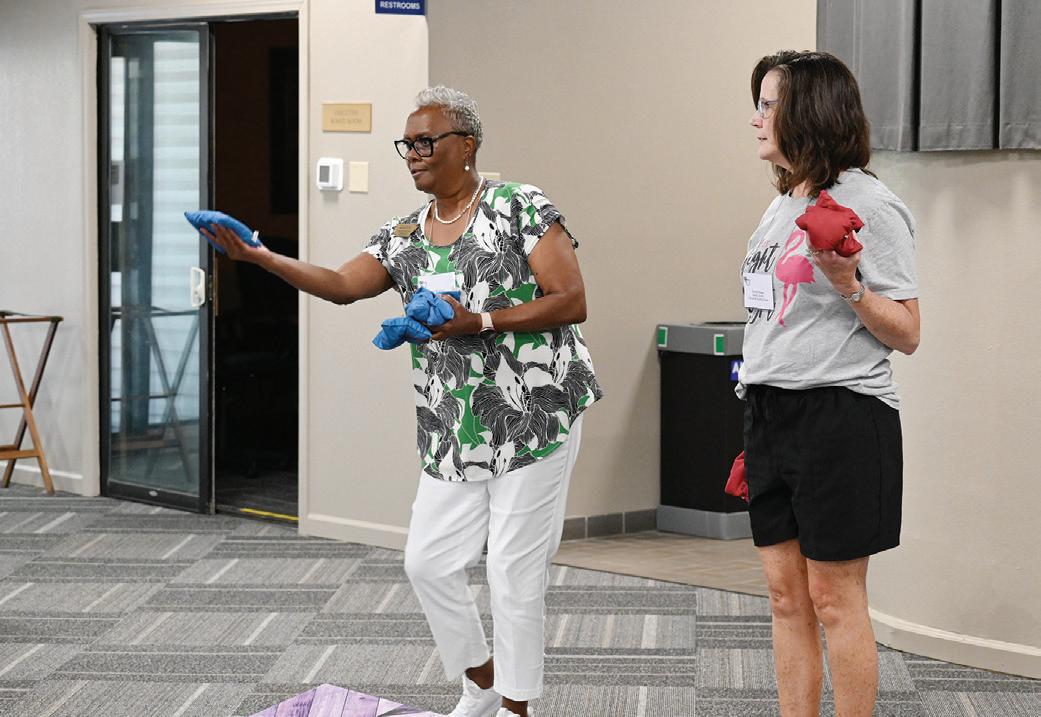
Top
Pulaski County Circuit Clerk Terri Hollingsworth and Pulaski County Chief Administrator Keith Rancifer. Left: Benton County IT Administrator Dustin Barton, Benton County Circuit Clerk Brenda DeShields, and Benton County Financial Administrator/Chief Administrator Jennifer Joyner
The Arkansas Circuit Clerks Association held its summer meeting June 27-30 in Fairfield Bay/Van Buren County.
Above Left: The meeting had a Hawaiian theme, and Association President and Washington County Circuit Clerk Kyle Sylvester was voted the best-dressed man. Above Middle: Arkansas Supreme Court Justice Courtney Hudson spoke to the group. Above Right: Cleburne County Circuit Clerk Heather Smith cracks up during a hula hoop challenge. Lee County Circuit Clerk Millie Hall is on the stage.
52 COUNTY LINES, SUMMER 2023
Left: Pictured are
chat during a break in the meeting.
COUNTY TREASURERS
The Arkansas County Treasurers’ Association gathered June 28-30 for its summer meeting in Texarkana/Miller County.



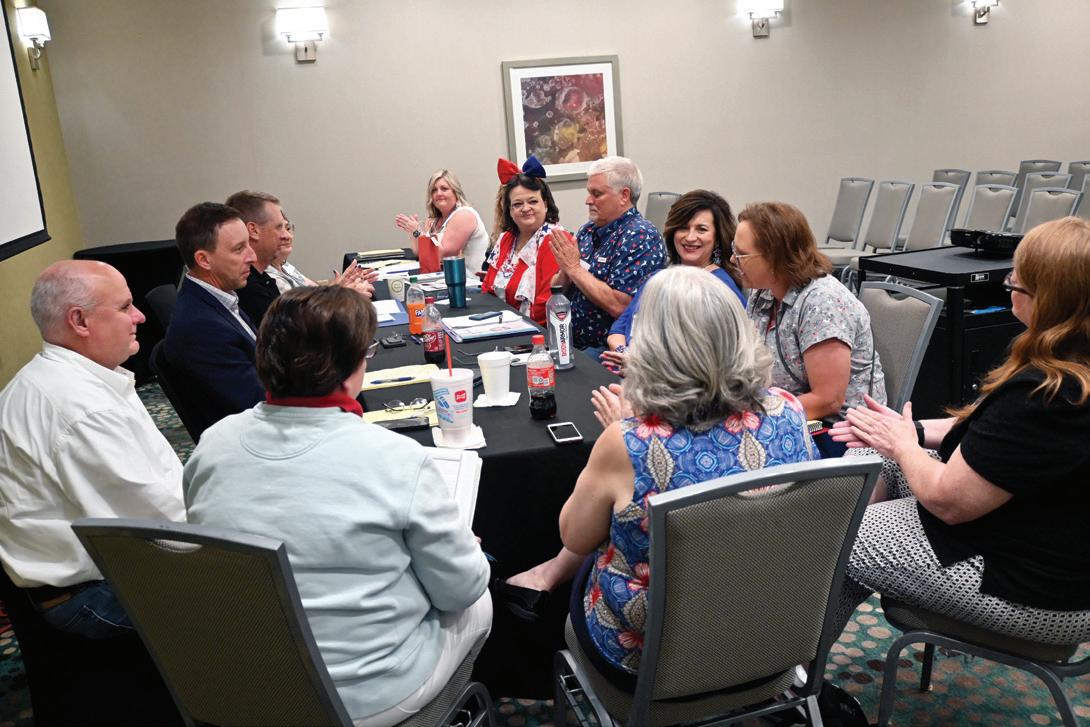
Top Left: Treasurers from Class 6 and 7 counties participate in a breakout session to discuss their policies and procedures.
Left: Miller County Treasurer Teresa Reed and Arkansas County Treasurers’ Association President Selena Blair display a proclamation naming June 28- 30 Arkansas County Treasurers Days in the city of Texarkana. Assistant Mayor of Texarkana Terry Roberts, left, and Texarkana Ward 3 Director Steven Hollibush presented the proclamation to the association during lunch.

AAC PHOTO RECAP
Above Left: Randolph County Treasurer Dennis Calaway presents Miller County Chief Deputy Treasurer Leslie Ross with a bouquet of flowers to show his appreciation for her help. Calaway explained to the group that as a new treasurer when he had a question, he decided to call another treasurer’s office across the state and Ross helped him every step of the way. Above Right: Treasurers gather for a picture at the Texarkana Post Office and Federal Courthouse. At the location, the treasurers straddle the state line between Arkansas and Texas.
Above: Fulton County Treasurer Barry Abney and Ashley County Treasurer Stacey Breshears are all smiles while leading a panel discussion about budget projections.
COUNTY LINES, SUMMER 2023 53
AAC PHOTO RECAP COUNTY ASSESSORS


The Arkansas County Assessor’s Association met June 2730 at Embassy


attendees to the second day of
 Suites in Hot Springs/Garland County.
Above: AAC Executive Director Chris Villines looks on as Pope County Assessor Dana Baker talks about her county’s recent experience of being hacked. Villines spoke to the assessors about a new state law involving county cybersecurity.
Above: Jefferson County Assessor Gloria Tillman and Izard County Assessor Tammy Sanders play a game of Bingo during a breakout session hosted by Arkansas CAMA Technology.
Above: Chicot County Assessor Faye Tate responds to fellow assessors during a panel discussion about best practices.
Right: Arkansas County Assessor’s Association President and Crittenden County Assessor Kim Hollowell welcomes
the meeting.
Suites in Hot Springs/Garland County.
Above: AAC Executive Director Chris Villines looks on as Pope County Assessor Dana Baker talks about her county’s recent experience of being hacked. Villines spoke to the assessors about a new state law involving county cybersecurity.
Above: Jefferson County Assessor Gloria Tillman and Izard County Assessor Tammy Sanders play a game of Bingo during a breakout session hosted by Arkansas CAMA Technology.
Above: Chicot County Assessor Faye Tate responds to fellow assessors during a panel discussion about best practices.
Right: Arkansas County Assessor’s Association President and Crittenden County Assessor Kim Hollowell welcomes
the meeting.
54 COUNTY LINES, SUMMER 2023
Left: Arkansas Assessment Coordination Division Deputy Director Robert McGee points to a chart while explaining the process to transition counties to four-year reappraisal cycles. This change from three-year and five-year cycles to four-year cycles is a result of change to state law during the 2023 legislative session.
COUNTY COLLECTORS





AAC PHOTO RECAP
County Tax Collectors convened June 21-23 in Texarkana/ Miller County.
Above Left: Collectors divided into five teams for a teamwork and communication activity that required them to rebuild an exact replica of a toy model with only short glances at the original as they went one at a time into the hallway. Above Right: Little River County was well represented by Chief Deputy Collector Mary Baker and Sheriff/Collector Bobby Walraven.
Above: AAC Continuing Education Program Director Michael Roys explains a teamwork and communication exercise to collectors.
Top Left: Van Buren County Collector Laura Shannon and Cleburne County Collector Connie Caldwell pose for a photo.
COUNTY LINES, SUMMER 2023 55
Left: Texarkana Assistant Mayor Terry Roberts and Ward 3 Director Steven Hollibush present collectors with a proclamation declaring June 21-23 as Arkansas County Tax Collector Days.
AAC PHOTO RECAP COUNTY CLERKS




 The Arkansas Association of County Clerks met June 20-23 in Jonesboro/Craighead County.
Above: While holding a buzzer above her head, Nevada County Clerk Tammie Rose yells out an answer during an exciting game of Jeopardy. Also pictured is Pike County Clerk Randi Reid.
Above: Secretary of State John Thurston talks with Greene County Clerk Phyllis Rhynes, Pope County Clerk Pam Ennis, Pope County Deputy Clerk Karri Warren and Columbia County Clerk Tammy Kimble Wiltz.
Left: Poinsett County Election Clerk Teresa Rouse and Election Coordinator Gina Oberg are all smiles while enjoying a break together.
Right: Baxter County Clerk Canda Reese poses a question to the group during an open mic portion of the meeting. Sitting beside Reese is Lindsay Roberts, Baxter County deputy clerk.
The Arkansas Association of County Clerks met June 20-23 in Jonesboro/Craighead County.
Above: While holding a buzzer above her head, Nevada County Clerk Tammie Rose yells out an answer during an exciting game of Jeopardy. Also pictured is Pike County Clerk Randi Reid.
Above: Secretary of State John Thurston talks with Greene County Clerk Phyllis Rhynes, Pope County Clerk Pam Ennis, Pope County Deputy Clerk Karri Warren and Columbia County Clerk Tammy Kimble Wiltz.
Left: Poinsett County Election Clerk Teresa Rouse and Election Coordinator Gina Oberg are all smiles while enjoying a break together.
Right: Baxter County Clerk Canda Reese poses a question to the group during an open mic portion of the meeting. Sitting beside Reese is Lindsay Roberts, Baxter County deputy clerk.
56 COUNTY LINES, SUMMER 2023
Above: Calhoun County and Circuit Clerk Jeanie Smith visits with Phillip Carper of DataScout, LLC.
COUNTY SHERIFFS

County), Sergeant at Arms Hobe Runion (Sebastian County) and Financial Chair Scott Sawyer (Polk County). Not pictured is Executive Secretary Tim Ryals (Faulkner County).




AAC PHOTO RECAP
The Arkansas Sheriffs’ Association held its summer meeting June 4-7 in Jonesboro/Craighead County.
Above left: Mississippi County Sheriff Dale Cook takes the oath of office. Above right: Columbia County Sheriff Leroy Martin and Jefferson County Juvenile Intake Officer Eric Hobbs pose for a photo prior to a session on writs, sex offenders and missing children.
Right: Retired NFL Referee Walt Coleman shares some inspiring words during the luncheon.
Far right: Arkansas Opioid Recovery Partnership Director Kirk Lane talks to sheriffs about the availability of naloxone.
COUNTY LINES, SUMMER 2023 57
Right: The 2023 Sheriffs’ Association Executive Board is comprised of (from left to right) Legislative Chair Shawn Stephens (Independence County), Secretary/Treasurer Shawn Holloway (Benton County), 1st Vice President Shane Jones (Pope County), President Dale Cook (Mississippi County), 2nd Vice President John Staley (Lonoke
AAC PHOTO RECAP
COUNTY JUDGES

The County Judges Association of Arkansas met May 31 through June 2 at the Hot Springs Convention Center in
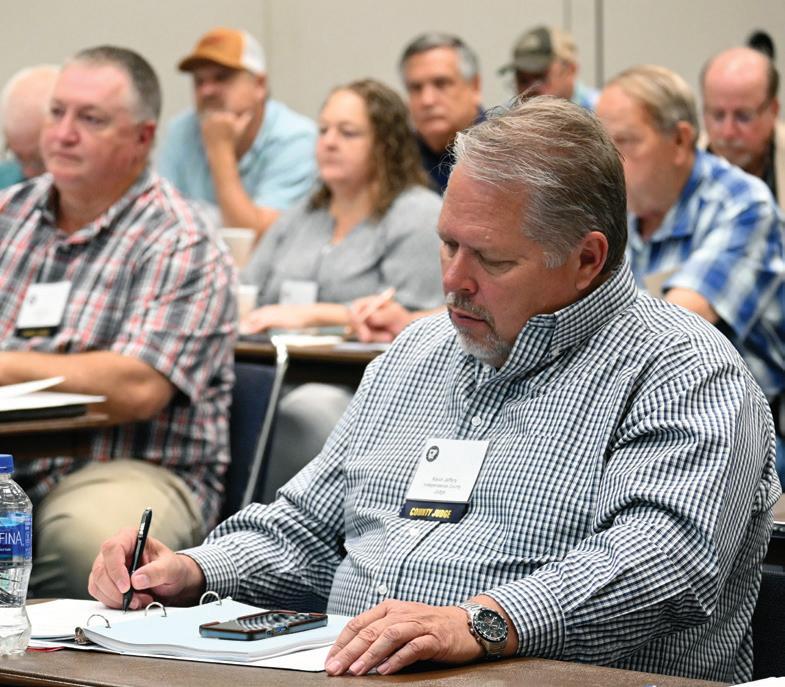


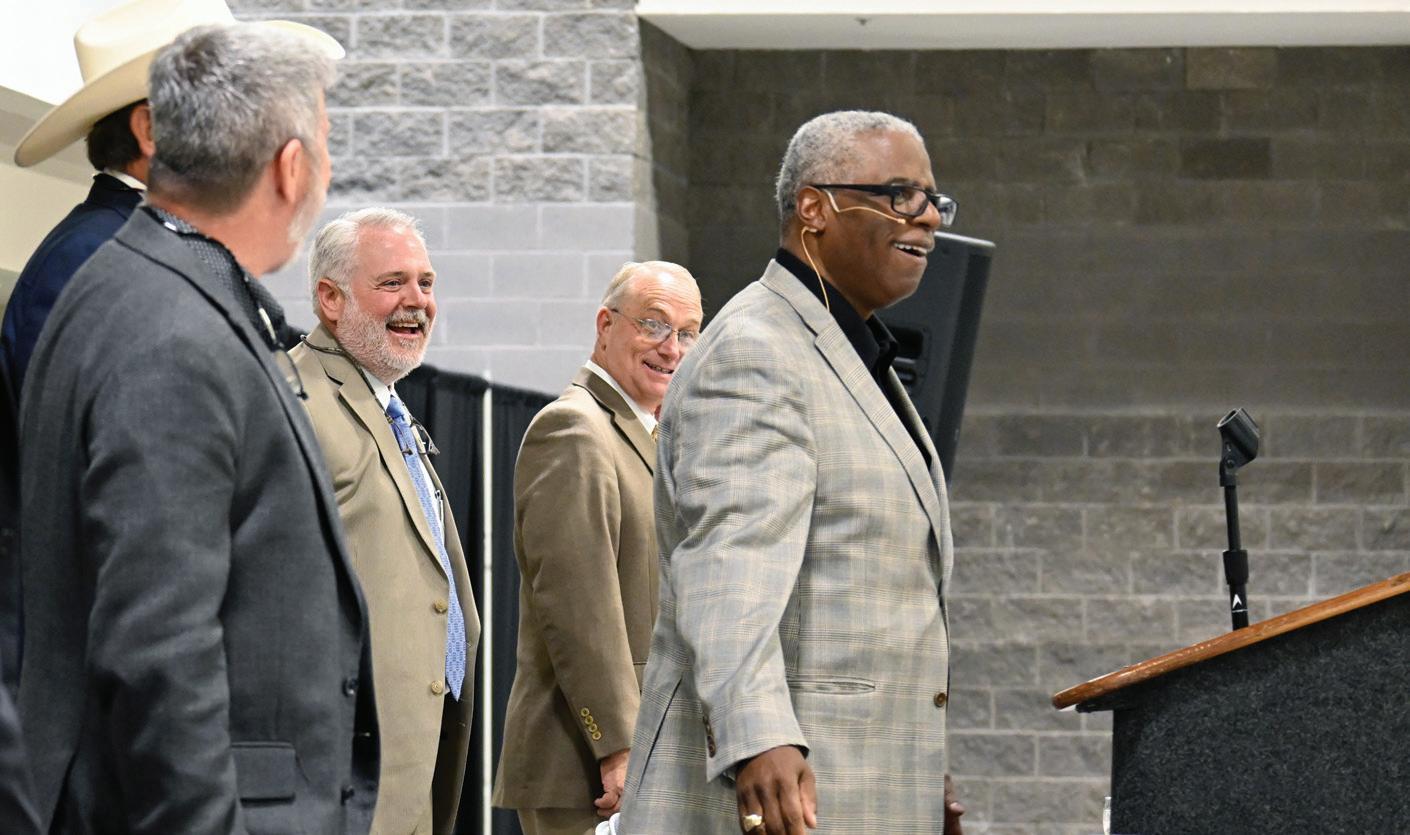 Garland County.
Above: Secretary of the Arkansas Dept. of Transformation and Shared Services Joseph Wood, while serving as the keynote speaker, taught attendees an acronym and hand movements. Also pictured from left are Jackson County Judge Jeff Phillips, Lonoke County Judge Doug Erwin, AAC Executive Director Chris Villines and Clark County Judge Troy Tucker.
Above: Polk County Judge Brandon Ellison shares some of his best practices when making purchases.
Below: Independence County Judge Kevin Jeffrey takes notes during a presentation.
Above: Benton County Judge Barry Moehring, AAC Chief Legal Counsel and Lawrence County Judge Gary Barnhill have a discussion during a break between sessions.
Garland County.
Above: Secretary of the Arkansas Dept. of Transformation and Shared Services Joseph Wood, while serving as the keynote speaker, taught attendees an acronym and hand movements. Also pictured from left are Jackson County Judge Jeff Phillips, Lonoke County Judge Doug Erwin, AAC Executive Director Chris Villines and Clark County Judge Troy Tucker.
Above: Polk County Judge Brandon Ellison shares some of his best practices when making purchases.
Below: Independence County Judge Kevin Jeffrey takes notes during a presentation.
Above: Benton County Judge Barry Moehring, AAC Chief Legal Counsel and Lawrence County Judge Gary Barnhill have a discussion during a break between sessions.
58 COUNTY LINES, SUMMER 2023
Right: Mississippi County Judge John Alan Nelson focuses while listening to a speaking as Woodruff County Judge Michael John Gray and Arkansas Department of Transportation State Aid Engineer Bryan Freeling are seated behind him.
When you participate in the AAC Workers’ Compensation Trust, you can relax in the hands of professional staff members who are going to take care of your needs. The AAC team has decades of experience in handling county government claims – they’re simply the best at what they do!


Did we mention that participants in our plan are accustomed to getting money back? Since we started paying dividends in 1997, the AAC Workers’ Compensation Trust has declared more than $32 MILLION dollars in dividends, payable to members of the fund. In fact, we mailed $650,000 in savings back to member counties in July 2023.
The service is available for any size county government and other county government-related entities.
We’ve got you covered!
1415 West Third Street • Little Rock, Arkansas 72201
enjoy dividends! $32 Million paid since 1997 Experienced & licensed examiners covered We’ve got you Debbie Norman Risk Management & Insurance Director 501.375.8247 Misty Petrus Claims Manager 501.375.8698 Kim Nash Claims Adjuster 501.375.8805, ext. 546 Renee Turner Claims Adjuster 501.375.8805, ext. 545 Kim Mitchell Premium Analyst 501.375.8805, ext. 541 Ellen Wood Admin. Assistant 501.375.8805, ext. 540 Brandy McAllister RMF General Counsel 501.375.8694
Association of Arkansas Counties Workers’ Compensation Trust Members
Workers’ Compensation Fund pays $650,000 in dividends to its member counties in 2023
he Association of Arkansas Counties Workers’ Compensation Trust is proud to announce that for the 27th straight year dividends will be returned to all participating counties. The 2023 dividend is declared based on 2019 premiums paid and losses incurred. This brings the total dividends paid over the last 27 years to $32,098,953.
AAC Workers’ Compensation Trust Group Manager Chris Villines recommended the $650,000 dividend to the board of trustees at its June meeting. Checks were issued in July.
“There are several reasons that we are able to continue returning such large sums to the counties,” Villines said. “Our staff is excellent and efficient and the counties of Arkansas work hard to minimize risks at home. I cannot compliment our Risk Management and Insurance Director Debbie Norman enough. She has an incredible responsibility and handles it wonderfully. The Workers’ Comp staff is equally adept. Misty Petrus, Kim Nash, Renee Turner, Kim Mitchell, and Ellen Wood do an excellent job.”
AAC Risk Management and Insurance Director Debbie Norman said, “From inception to today, this program has performed beyond expectations. It has always been our goal to reward counties with dividends, and this is the 27th straight year that successful management of the program and the commitment to safety in our counties has allowed it to occur.”
AAC, along with county officials from around the state, created the AAC Workers’ Compensation Trust in 1985 — a plan to pool resources and form a self-
funded, county-owned trust to provide premium Workers’ Compensation coverage at a savings to members. The AAC Workers’ Compensation Trust is fully regulated by the State of Arkansas Workers’ Compensation Commission. Current trustees are Jimmy Hart, Conway County Judge; Debbie Wise, Randolph County Circuit Clerk; Debra Buckner, Pulaski County Treasurer; Brandon Ellison, Polk County Judge; and Rusty McMillon, Greene County Judge.
Here are the formulaic dividend amounts per county as approved by the AAC/WCT board:
AAC FEATURE
TArkansas County............................$500 Ashley County.............................$6,700 Baxter County...........................$10,296 Benton County.........................$29,415 Boone County............................$6,530 Bradley County...........................$5,439 Calhoun County.........................$4,766 Carroll County............................$9,747 Chicot County............................$4,406 Clark County..............................$6,085 Clay County...............................$3,850 Cleburne County........................$9,495 Cleveland County.......................$4,254 Columbia County.......................$6,433 Conway County..........................$7,885 Craighead County.....................$19,278 Crawford County......................$12,694 Crittenden County...................$10,929 Cross County.................................$500 Dallas County.............................$4,620 Desha County.............................$4,065 Drew County..............................$8,100 Faulkner County.......................$15,965 Franklin County.........................$6,283 Fulton County............................$5,069 Garland County........................$21,240 Grant County..............................$6,007 Greene County...........................$7,998 Hempstead County...................$12,698 Hot Spring County.....................$8,480 Howard County..........................$6,069 Independence County..............$18,858 Izard County...............................$4,123 Jackson County...........................$5,692 Jefferson County.......................$18,677 Johnson County..........................$9,277 Lafayette County.........................$5,410 Lawrence County........................$5,399 Lee County....................................$500 Lincoln County...........................$4,717 Little River County...................$14,908 Logan County.............................$9,218 Lonoke County...........................$9,148 Madison County.......................$10,356 Marion County.........................$11,280 Miller County...........................$12,636 Mississippi County......................$8,360 Monroe County..........................$4,399 Montgomery County..................$4,239 Nevada County...........................$6,408 Newton County..........................$3,443 Ouachita County......................$11,537 Perry County...............................$1,605 Phillips County...........................$5,834 Pike County................................$7,475 Poinsett County..........................$8,101 Polk County................................$8,539 Pope County.............................$16,665 Prairie County.............................$2,699 Pulaski County............................$1,816 Randolph County.....................$13,229 Saline County............................$11,450 Scott County...............................$6,073 Searcy County.............................$5,175 Sebastian County......................$16,586 Sevier County..............................$7,280 Sharp County..............................$9,065 St. Francis County..........................$500 Stone County.................................$500 Union County.............................$9,174 Van Buren County......................$3,652 Washington County..................$48,128 White County..........................$10,901 Woodruff County..........................$500 Yell County...............................$10,672 www.arcounties.org 60 COUNTY LINES, SUMMER 2023
Arkansas counties receive $8.2 million in PILT payments
n June, The Department of the Interior announced that more than 1,900 state and local governments around the country will receive a total of $578.8 million in Payments in Lieu of Taxes funding for 2023. Because local governments cannot tax federal lands, annual PILT payments help to defray the costs associated with maintaining important community services.
PILT payments are made for tax-exempt federal lands administered by the Department’s bureaus - including the Bureau of Land Management, Bureau of Reclamation, U.S. Fish and Wildlife Service, and National Park Service. In addition, PILT payments cover federal lands administered by the U.S. Forest Service, U.S. Army Corps of Engineers, and Utah Reclamation Mitigation and Conservation Commission. Payments are calculated based on the number of acres of federal land within each county or jurisdiction and the population of that county or jurisdiction.
“The Biden-Harris administration is committed to boosting local communities,” said Principal Deputy Assistant Secretary for Policy, Management and Budget Joan Mooney.
“PILT payments help local governments carry out vital services, such as firefighting and police protection, construction of public schools and roads, and search-and-rescue operations. We are grateful for our ongoing partnerships with local jurisdictions across the country who help the Interior Department fulfill our mission on behalf of the American public.”
Since PILT payments began in 1977, the Department has distributed nearly $11.4 billion to states, the District of Columbia, Puerto Rico, Guam and the U.S. Virgin Islands.
The Department collects more than $26.3 billion in revenue annually from commercial activities on public lands. A portion of those revenues is shared with states and counties. The balance is deposited into the U.S. Treasury, which, in turn, pays for a broad array of federal activities, including PILT funding.
Individual payments may vary from year to year as a result of changes in acreage data, which are updated annually by the federal agency administering the land; prior-year federal revenue-sharing payments reported annually by the governor of each state; and inflationary adjustments using the Consumer Price Index and population data, which are updated using information from the U.S. Census Bureau.
At right is a breakdown of the FY 2023 PILT payments to Arkansas counties that contain federal lands. Not all Arkansas counties contain federal lands — Bradley, Cleveland, Drew, Grant, Independence, Jackson, Lawrence, Lonoke, Miller, Nevada, Prairie, and Randolph counties. Calhoun, Crittenden, and White counties have 10, 2, and 42 acres of federal land, respectively, did not qualify for payments. Scott and Montgomery counties have the largest amounts of federal land, with 368,017 acres and 357,703 acres, respectively.
— Courtesy of U.S. Department of the Interior press release
AAC FEATURE
IArkansas Ashley Baxter Benton Boone Carroll Chicot Clark Clay Cleburne Columbia Conway Craighead Crawford Cross Dallas Desha Faulkner Franklin Fulton Garland Greene Hempstead Hot Spring Howard Izard Jefferson Johnson Lafayette Lee Lincoln Little River Logan Madison Marion Mississippi Monroe Montgomery Newton Ouachita Perry Phillips Pike Poinsett Polk Pope Pulaski Saline Scott Sebastian Sevier Sharp St. Francis Stone Union Van Buren Washington Woodruff Yell $21,903 $6,287 $312,078 $124,127 $43,356 $26,218 $1,423 $56,341 $1,407 $95,162 $392 $3,221 $8,713 $226,843 $126 $126 $12,670 $735 $318,418 $11,247 $479,767 $1,268 $16,363 $40,932 $47,789 $252 $9,130 $486,262 $3,369 $25,596 $120 $52,361 $330,716 $123,584 $235,072 $28,963 $41,492 $843,832 $583,024 $378 $247,320 $31,690 $85,623 $22,992 $487,588 $536,102 $5,457 $156,294 $845,733 $145,227 $60,779 $126 $793 $156,157 $2,103 $117,940 $69,015 $4,555 $542,146 6,958 2,130 110,800 40,125 13,773 8,329 452 17,898 447 30,803 160 7,163 2,768 86,118 40 40 4,025 242 120,806 3,573 161,830 403 5,198 13,029 15,571 80 3,504 194,961 1,070 11,909 38 16,634 122,606 48,484 74,952 9,201 13,181 357,703 236,990 120 100,603 11,042 29,537 7,304 205,933 200,686 1,765 58,622 368,017 76,814 19,308 40 252 61,478 668 42,087 25,068 1,447 242,657 COUNTY PAYMENT ACRES COUNTY LINES, SUMMER 2023 61
About NACo – The Voice of America’s Counties National Association of Counties (NACo) is the only national organization that represents county governments in the U.S. NACo provides essential services to the nation’s 3,068 counties. NACo advances issues with a unified voice before the federal government, improves the public’s understanding of county government, assists counties in finding and sharing innovative solutions through education and research and provides value-added services to save counties and taxpayers money. www.naco.org

Ramsey County, Minnesota’s Mary Jo McGuire takes office as NACo president
WASHINGTON – Ramsey County, Minnesota Commissioner Mary Jo McGuire was sworn in as president of the National Association of Counties (NACo) on July 24 at the conclusion of NACo’s 88th Annual Conference in Travis County, Texas.
“It is an honor to begin this journey, and I look forward to an extraordinary year ahead as we strengthen America’s counties,” said McGuire. “We will build on our solid foundation, and together, expand opportunities for a brighter future.”
During her inaugural remarks at the conference, McGuire outlined her presidential spotlight, “Forward Together.” The three pillars of the spotlight are:
Connect, focused on building bridges to advance excellence and networks in county government Inspire, focused on driving community engagement and residents’ trust in county government, and Lead, focused on spearheading local, state, federal and
tribal intergovernmental partnerships and common-sense policy solutions.
A Ramsey County commissioner since 2012, McGuire previously served 16 years in the Minnesota State Legislature in both the House and Senate. She has been an active member of NACo, serving on multiple boards and advisory committees, and has held several leadership positions in the Association of Minnesota Counties, where she also currently serves as president.
“We are poised for great accomplishments in the coming year,” said McGuire, “As county leaders, we have unlimited potential to advance to our priorities and lead forward together.”
Nearly 100 members of the Minnesota delegation to the conference joined McGuire on stage as she took the oath of office.
— NACo staff
This publication was made possible with the support of these advertising partners who have helped to underwrite the cost of County Lines. They deserve your consideration and patronage when making your purchasing decisions. For more information on how to partner with County Lines, please call Christy L. Smith at (501) 372-7550.
Advertiser Resource Index AAC Workers’ Compensation 57 Apprentice Information Systems 63 ARBuy 11 Crews and Associates . . . . . . . . . . . . . . . . . . . . . . . . . . . . . . . Back Cover DataScout Inside Front Cover Ergon Asphalt & Paving . . . . . . . . . . . . . . . . . . . . . . . . . . . . . . . . . . . 4 Financial Intelligence 17 Guardian RFID 37 National Association of Counties . . . . . . . . . . . . . . . . . . . . . . . . . . . . . . 32 Nationwide Insurance 50 Rainwater Holt & Sexton, PA . . . . . . . . . . . . . . . . . . . . . . . . . . . . . . . . . . 3 Southern Tire Mart 8 Tax Pro 10 Young’s Irrigation & Equipment, LLC 23
NEWS FROM NACO
AAC
62 COUNTY LINES, SUMMER 2023





A good partnership can be powerful. So when you’re choosing the team to help develop the right financial plan, you can count on Crews. We’re proud to invest in the local progress of solar energy and Green Bond projects, and we’re ready to help make them a valuable resource to your community. Member FINRA & SIPC Bonds | Leases | Loans crewsfs.com SMART ENERGY STARTS WITH SMART INVESTMENTS. Association of Arkansas Counties 1415 West 3rd St. Little Rock, AR 72201 PRSRT STD U.S. POSTAGE PAID LITTLE ROCK, AR PERMIT No. 2797



































 Wise Randolph County Circuit Clerk / AAC Board President
Wise Randolph County Circuit Clerk / AAC Board President

















 Spence
Spence






























































































 Suites in Hot Springs/Garland County.
Above: AAC Executive Director Chris Villines looks on as Pope County Assessor Dana Baker talks about her county’s recent experience of being hacked. Villines spoke to the assessors about a new state law involving county cybersecurity.
Above: Jefferson County Assessor Gloria Tillman and Izard County Assessor Tammy Sanders play a game of Bingo during a breakout session hosted by Arkansas CAMA Technology.
Above: Chicot County Assessor Faye Tate responds to fellow assessors during a panel discussion about best practices.
Right: Arkansas County Assessor’s Association President and Crittenden County Assessor Kim Hollowell welcomes
the meeting.
Suites in Hot Springs/Garland County.
Above: AAC Executive Director Chris Villines looks on as Pope County Assessor Dana Baker talks about her county’s recent experience of being hacked. Villines spoke to the assessors about a new state law involving county cybersecurity.
Above: Jefferson County Assessor Gloria Tillman and Izard County Assessor Tammy Sanders play a game of Bingo during a breakout session hosted by Arkansas CAMA Technology.
Above: Chicot County Assessor Faye Tate responds to fellow assessors during a panel discussion about best practices.
Right: Arkansas County Assessor’s Association President and Crittenden County Assessor Kim Hollowell welcomes
the meeting.









 The Arkansas Association of County Clerks met June 20-23 in Jonesboro/Craighead County.
Above: While holding a buzzer above her head, Nevada County Clerk Tammie Rose yells out an answer during an exciting game of Jeopardy. Also pictured is Pike County Clerk Randi Reid.
Above: Secretary of State John Thurston talks with Greene County Clerk Phyllis Rhynes, Pope County Clerk Pam Ennis, Pope County Deputy Clerk Karri Warren and Columbia County Clerk Tammy Kimble Wiltz.
Left: Poinsett County Election Clerk Teresa Rouse and Election Coordinator Gina Oberg are all smiles while enjoying a break together.
Right: Baxter County Clerk Canda Reese poses a question to the group during an open mic portion of the meeting. Sitting beside Reese is Lindsay Roberts, Baxter County deputy clerk.
The Arkansas Association of County Clerks met June 20-23 in Jonesboro/Craighead County.
Above: While holding a buzzer above her head, Nevada County Clerk Tammie Rose yells out an answer during an exciting game of Jeopardy. Also pictured is Pike County Clerk Randi Reid.
Above: Secretary of State John Thurston talks with Greene County Clerk Phyllis Rhynes, Pope County Clerk Pam Ennis, Pope County Deputy Clerk Karri Warren and Columbia County Clerk Tammy Kimble Wiltz.
Left: Poinsett County Election Clerk Teresa Rouse and Election Coordinator Gina Oberg are all smiles while enjoying a break together.
Right: Baxter County Clerk Canda Reese poses a question to the group during an open mic portion of the meeting. Sitting beside Reese is Lindsay Roberts, Baxter County deputy clerk.









 Garland County.
Above: Secretary of the Arkansas Dept. of Transformation and Shared Services Joseph Wood, while serving as the keynote speaker, taught attendees an acronym and hand movements. Also pictured from left are Jackson County Judge Jeff Phillips, Lonoke County Judge Doug Erwin, AAC Executive Director Chris Villines and Clark County Judge Troy Tucker.
Above: Polk County Judge Brandon Ellison shares some of his best practices when making purchases.
Below: Independence County Judge Kevin Jeffrey takes notes during a presentation.
Above: Benton County Judge Barry Moehring, AAC Chief Legal Counsel and Lawrence County Judge Gary Barnhill have a discussion during a break between sessions.
Garland County.
Above: Secretary of the Arkansas Dept. of Transformation and Shared Services Joseph Wood, while serving as the keynote speaker, taught attendees an acronym and hand movements. Also pictured from left are Jackson County Judge Jeff Phillips, Lonoke County Judge Doug Erwin, AAC Executive Director Chris Villines and Clark County Judge Troy Tucker.
Above: Polk County Judge Brandon Ellison shares some of his best practices when making purchases.
Below: Independence County Judge Kevin Jeffrey takes notes during a presentation.
Above: Benton County Judge Barry Moehring, AAC Chief Legal Counsel and Lawrence County Judge Gary Barnhill have a discussion during a break between sessions.







